Entrepreneurship and Small Business Management
VerifiedAdded on 2021/02/22
|19
|6188
|194
AI Summary
The provided report is concerned with entrepreneurship, entrepreneurs, and enterprise, discussing basic concepts, small-scale businesses' impact on the economy, traits of entrepreneurs, and factors that lead to entrepreneurial personality and mindset. The report references various books on entrepreneurship and small business management.
Contribute Materials
Your contribution can guide someone’s learning journey. Share your
documents today.

UNIT 9
Entrepreneurship and Small Business Management
1
Entrepreneurship and Small Business Management
1
Secure Best Marks with AI Grader
Need help grading? Try our AI Grader for instant feedback on your assignments.
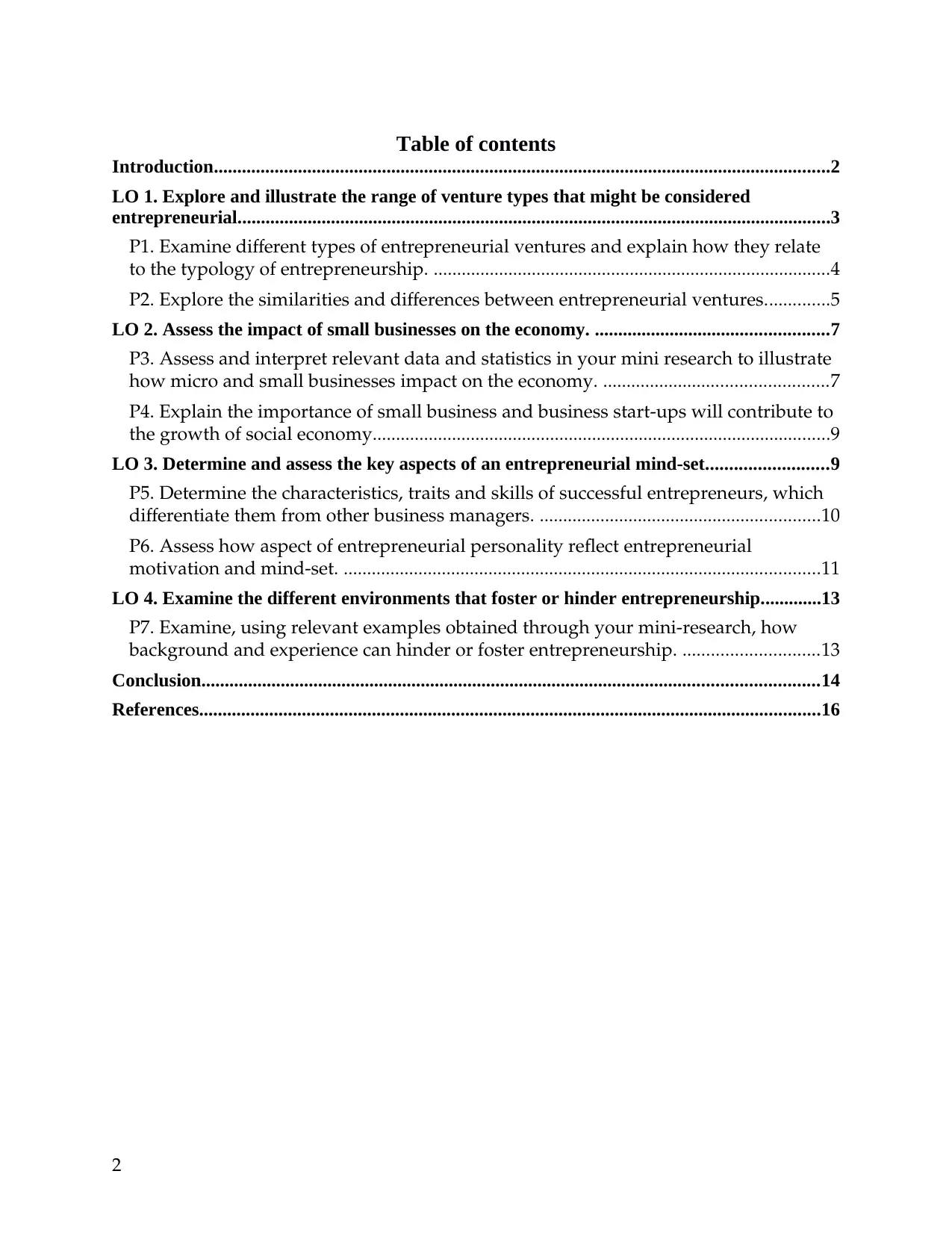
Table of contents
Introduction....................................................................................................................................2
LO 1. Explore and illustrate the range of venture types that might be considered
entrepreneurial...............................................................................................................................3
P1. Examine different types of entrepreneurial ventures and explain how they relate
to the typology of entrepreneurship. .....................................................................................4
P2. Explore the similarities and differences between entrepreneurial ventures..............5
LO 2. Assess the impact of small businesses on the economy. ..................................................7
P3. Assess and interpret relevant data and statistics in your mini research to illustrate
how micro and small businesses impact on the economy. ................................................7
P4. Explain the importance of small business and business start-ups will contribute to
the growth of social economy..................................................................................................9
LO 3. Determine and assess the key aspects of an entrepreneurial mind-set..........................9
P5. Determine the characteristics, traits and skills of successful entrepreneurs, which
differentiate them from other business managers. ............................................................10
P6. Assess how aspect of entrepreneurial personality reflect entrepreneurial
motivation and mind-set. ......................................................................................................11
LO 4. Examine the different environments that foster or hinder entrepreneurship.............13
P7. Examine, using relevant examples obtained through your mini-research, how
background and experience can hinder or foster entrepreneurship. .............................13
Conclusion....................................................................................................................................14
References.....................................................................................................................................16
2
Introduction....................................................................................................................................2
LO 1. Explore and illustrate the range of venture types that might be considered
entrepreneurial...............................................................................................................................3
P1. Examine different types of entrepreneurial ventures and explain how they relate
to the typology of entrepreneurship. .....................................................................................4
P2. Explore the similarities and differences between entrepreneurial ventures..............5
LO 2. Assess the impact of small businesses on the economy. ..................................................7
P3. Assess and interpret relevant data and statistics in your mini research to illustrate
how micro and small businesses impact on the economy. ................................................7
P4. Explain the importance of small business and business start-ups will contribute to
the growth of social economy..................................................................................................9
LO 3. Determine and assess the key aspects of an entrepreneurial mind-set..........................9
P5. Determine the characteristics, traits and skills of successful entrepreneurs, which
differentiate them from other business managers. ............................................................10
P6. Assess how aspect of entrepreneurial personality reflect entrepreneurial
motivation and mind-set. ......................................................................................................11
LO 4. Examine the different environments that foster or hinder entrepreneurship.............13
P7. Examine, using relevant examples obtained through your mini-research, how
background and experience can hinder or foster entrepreneurship. .............................13
Conclusion....................................................................................................................................14
References.....................................................................................................................................16
2
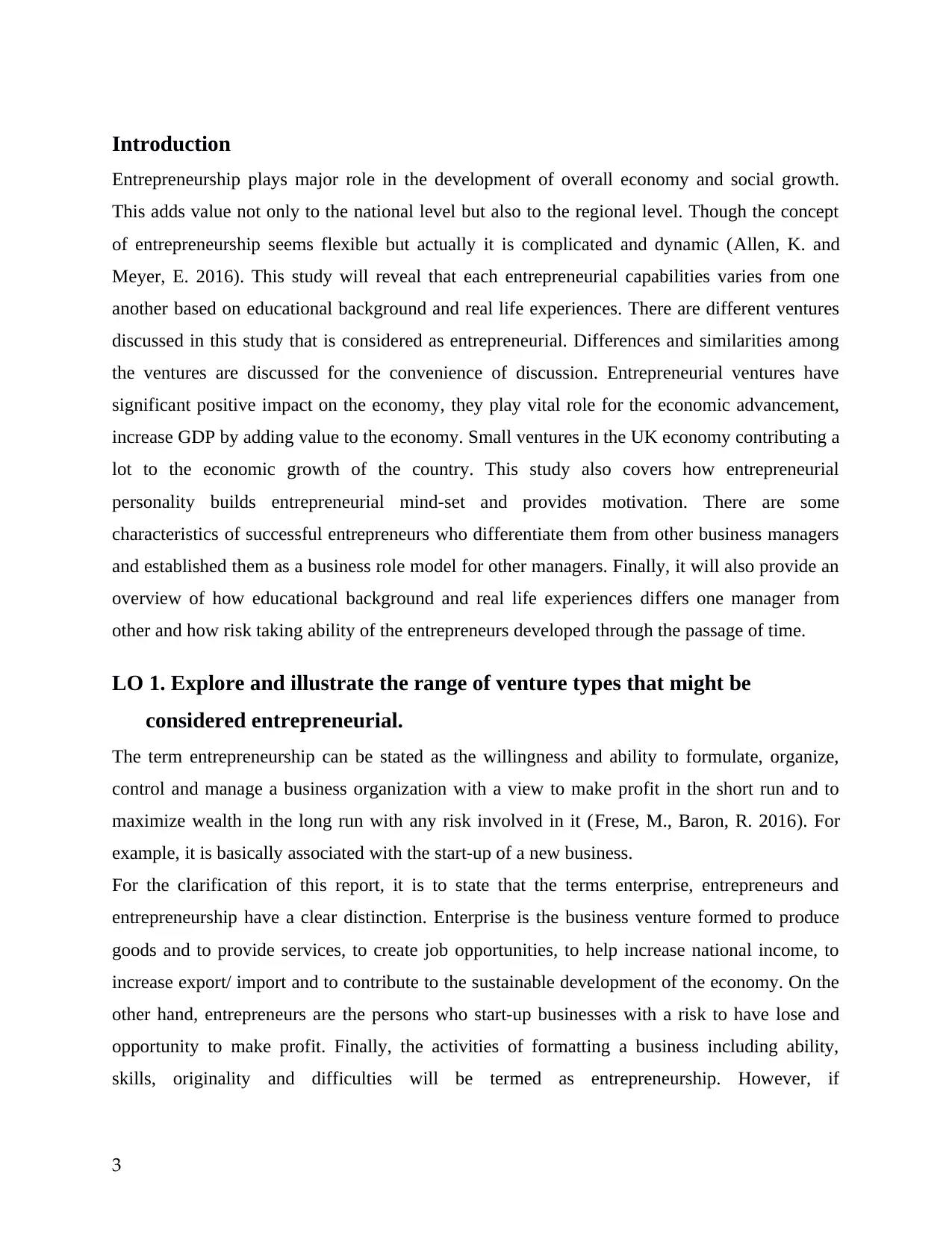
Introduction
Entrepreneurship plays major role in the development of overall economy and social growth.
This adds value not only to the national level but also to the regional level. Though the concept
of entrepreneurship seems flexible but actually it is complicated and dynamic (Allen, K. and
Meyer, E. 2016). This study will reveal that each entrepreneurial capabilities varies from one
another based on educational background and real life experiences. There are different ventures
discussed in this study that is considered as entrepreneurial. Differences and similarities among
the ventures are discussed for the convenience of discussion. Entrepreneurial ventures have
significant positive impact on the economy, they play vital role for the economic advancement,
increase GDP by adding value to the economy. Small ventures in the UK economy contributing a
lot to the economic growth of the country. This study also covers how entrepreneurial
personality builds entrepreneurial mind-set and provides motivation. There are some
characteristics of successful entrepreneurs who differentiate them from other business managers
and established them as a business role model for other managers. Finally, it will also provide an
overview of how educational background and real life experiences differs one manager from
other and how risk taking ability of the entrepreneurs developed through the passage of time.
LO 1. Explore and illustrate the range of venture types that might be
considered entrepreneurial.
The term entrepreneurship can be stated as the willingness and ability to formulate, organize,
control and manage a business organization with a view to make profit in the short run and to
maximize wealth in the long run with any risk involved in it (Frese, M., Baron, R. 2016). For
example, it is basically associated with the start-up of a new business.
For the clarification of this report, it is to state that the terms enterprise, entrepreneurs and
entrepreneurship have a clear distinction. Enterprise is the business venture formed to produce
goods and to provide services, to create job opportunities, to help increase national income, to
increase export/ import and to contribute to the sustainable development of the economy. On the
other hand, entrepreneurs are the persons who start-up businesses with a risk to have lose and
opportunity to make profit. Finally, the activities of formatting a business including ability,
skills, originality and difficulties will be termed as entrepreneurship. However, if
3
Entrepreneurship plays major role in the development of overall economy and social growth.
This adds value not only to the national level but also to the regional level. Though the concept
of entrepreneurship seems flexible but actually it is complicated and dynamic (Allen, K. and
Meyer, E. 2016). This study will reveal that each entrepreneurial capabilities varies from one
another based on educational background and real life experiences. There are different ventures
discussed in this study that is considered as entrepreneurial. Differences and similarities among
the ventures are discussed for the convenience of discussion. Entrepreneurial ventures have
significant positive impact on the economy, they play vital role for the economic advancement,
increase GDP by adding value to the economy. Small ventures in the UK economy contributing a
lot to the economic growth of the country. This study also covers how entrepreneurial
personality builds entrepreneurial mind-set and provides motivation. There are some
characteristics of successful entrepreneurs who differentiate them from other business managers
and established them as a business role model for other managers. Finally, it will also provide an
overview of how educational background and real life experiences differs one manager from
other and how risk taking ability of the entrepreneurs developed through the passage of time.
LO 1. Explore and illustrate the range of venture types that might be
considered entrepreneurial.
The term entrepreneurship can be stated as the willingness and ability to formulate, organize,
control and manage a business organization with a view to make profit in the short run and to
maximize wealth in the long run with any risk involved in it (Frese, M., Baron, R. 2016). For
example, it is basically associated with the start-up of a new business.
For the clarification of this report, it is to state that the terms enterprise, entrepreneurs and
entrepreneurship have a clear distinction. Enterprise is the business venture formed to produce
goods and to provide services, to create job opportunities, to help increase national income, to
increase export/ import and to contribute to the sustainable development of the economy. On the
other hand, entrepreneurs are the persons who start-up businesses with a risk to have lose and
opportunity to make profit. Finally, the activities of formatting a business including ability,
skills, originality and difficulties will be termed as entrepreneurship. However, if
3
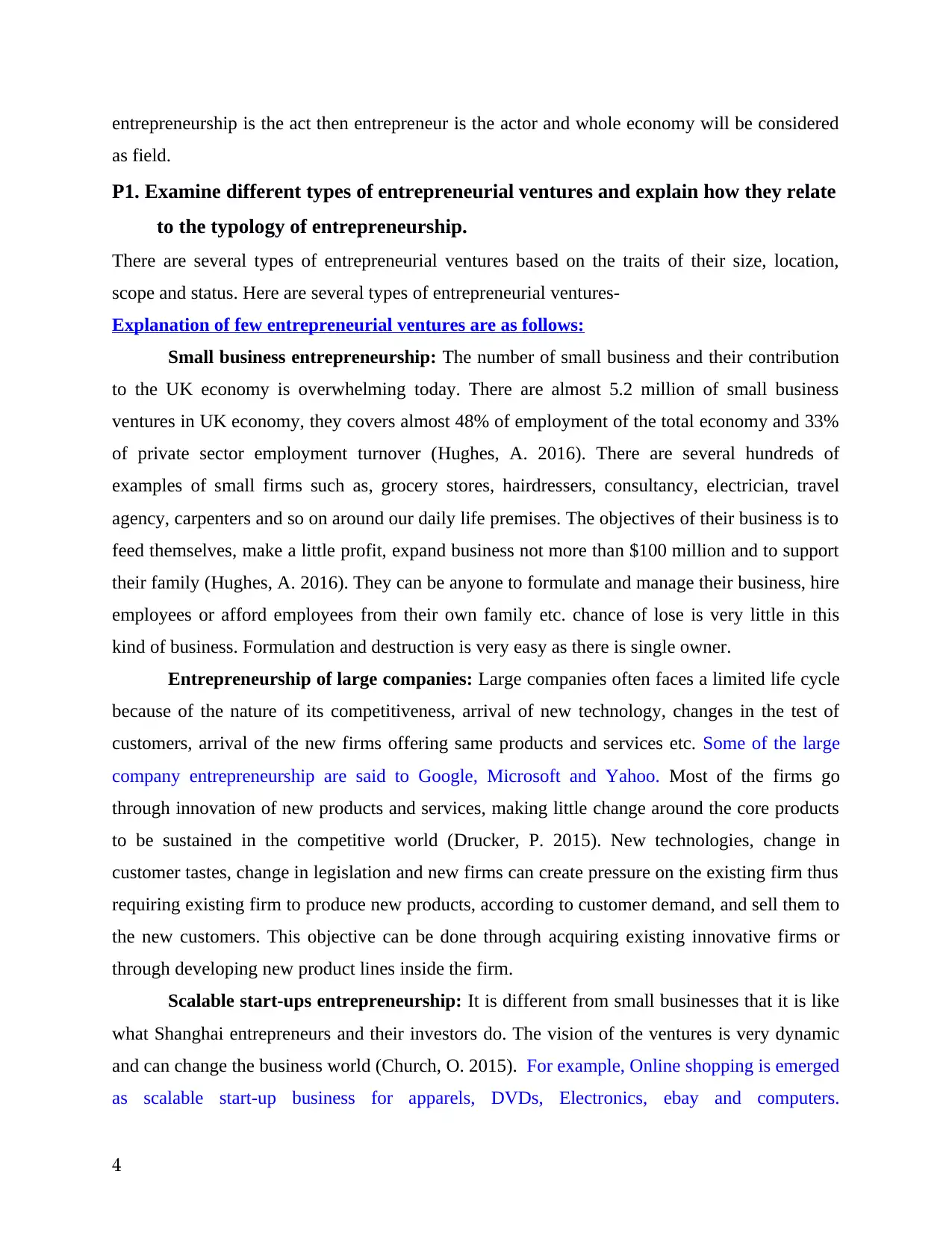
entrepreneurship is the act then entrepreneur is the actor and whole economy will be considered
as field.
P1. Examine different types of entrepreneurial ventures and explain how they relate
to the typology of entrepreneurship.
There are several types of entrepreneurial ventures based on the traits of their size, location,
scope and status. Here are several types of entrepreneurial ventures-
Explanation of few entrepreneurial ventures are as follows:
Small business entrepreneurship: The number of small business and their contribution
to the UK economy is overwhelming today. There are almost 5.2 million of small business
ventures in UK economy, they covers almost 48% of employment of the total economy and 33%
of private sector employment turnover (Hughes, A. 2016). There are several hundreds of
examples of small firms such as, grocery stores, hairdressers, consultancy, electrician, travel
agency, carpenters and so on around our daily life premises. The objectives of their business is to
feed themselves, make a little profit, expand business not more than $100 million and to support
their family (Hughes, A. 2016). They can be anyone to formulate and manage their business, hire
employees or afford employees from their own family etc. chance of lose is very little in this
kind of business. Formulation and destruction is very easy as there is single owner.
Entrepreneurship of large companies: Large companies often faces a limited life cycle
because of the nature of its competitiveness, arrival of new technology, changes in the test of
customers, arrival of the new firms offering same products and services etc. Some of the large
company entrepreneurship are said to Google, Microsoft and Yahoo. Most of the firms go
through innovation of new products and services, making little change around the core products
to be sustained in the competitive world (Drucker, P. 2015). New technologies, change in
customer tastes, change in legislation and new firms can create pressure on the existing firm thus
requiring existing firm to produce new products, according to customer demand, and sell them to
the new customers. This objective can be done through acquiring existing innovative firms or
through developing new product lines inside the firm.
Scalable start-ups entrepreneurship: It is different from small businesses that it is like
what Shanghai entrepreneurs and their investors do. The vision of the ventures is very dynamic
and can change the business world (Church, O. 2015). For example, Online shopping is emerged
as scalable start-up business for apparels, DVDs, Electronics, ebay and computers.
4
as field.
P1. Examine different types of entrepreneurial ventures and explain how they relate
to the typology of entrepreneurship.
There are several types of entrepreneurial ventures based on the traits of their size, location,
scope and status. Here are several types of entrepreneurial ventures-
Explanation of few entrepreneurial ventures are as follows:
Small business entrepreneurship: The number of small business and their contribution
to the UK economy is overwhelming today. There are almost 5.2 million of small business
ventures in UK economy, they covers almost 48% of employment of the total economy and 33%
of private sector employment turnover (Hughes, A. 2016). There are several hundreds of
examples of small firms such as, grocery stores, hairdressers, consultancy, electrician, travel
agency, carpenters and so on around our daily life premises. The objectives of their business is to
feed themselves, make a little profit, expand business not more than $100 million and to support
their family (Hughes, A. 2016). They can be anyone to formulate and manage their business, hire
employees or afford employees from their own family etc. chance of lose is very little in this
kind of business. Formulation and destruction is very easy as there is single owner.
Entrepreneurship of large companies: Large companies often faces a limited life cycle
because of the nature of its competitiveness, arrival of new technology, changes in the test of
customers, arrival of the new firms offering same products and services etc. Some of the large
company entrepreneurship are said to Google, Microsoft and Yahoo. Most of the firms go
through innovation of new products and services, making little change around the core products
to be sustained in the competitive world (Drucker, P. 2015). New technologies, change in
customer tastes, change in legislation and new firms can create pressure on the existing firm thus
requiring existing firm to produce new products, according to customer demand, and sell them to
the new customers. This objective can be done through acquiring existing innovative firms or
through developing new product lines inside the firm.
Scalable start-ups entrepreneurship: It is different from small businesses that it is like
what Shanghai entrepreneurs and their investors do. The vision of the ventures is very dynamic
and can change the business world (Church, O. 2015). For example, Online shopping is emerged
as scalable start-up business for apparels, DVDs, Electronics, ebay and computers.
4
Secure Best Marks with AI Grader
Need help grading? Try our AI Grader for instant feedback on your assignments.
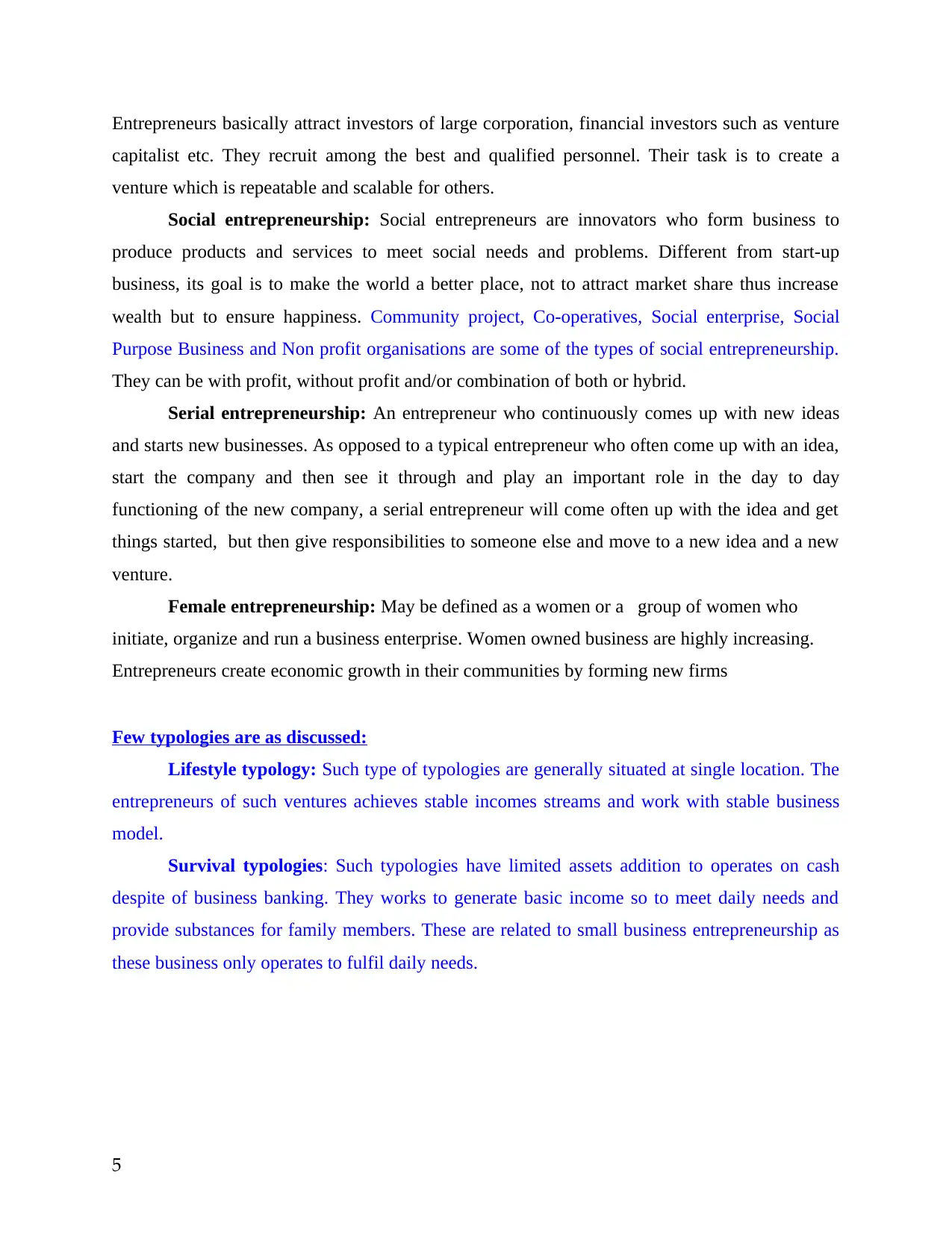
Entrepreneurs basically attract investors of large corporation, financial investors such as venture
capitalist etc. They recruit among the best and qualified personnel. Their task is to create a
venture which is repeatable and scalable for others.
Social entrepreneurship: Social entrepreneurs are innovators who form business to
produce products and services to meet social needs and problems. Different from start-up
business, its goal is to make the world a better place, not to attract market share thus increase
wealth but to ensure happiness. Community project, Co-operatives, Social enterprise, Social
Purpose Business and Non profit organisations are some of the types of social entrepreneurship.
They can be with profit, without profit and/or combination of both or hybrid.
Serial entrepreneurship: An entrepreneur who continuously comes up with new ideas
and starts new businesses. As opposed to a typical entrepreneur who often come up with an idea,
start the company and then see it through and play an important role in the day to day
functioning of the new company, a serial entrepreneur will come often up with the idea and get
things started, but then give responsibilities to someone else and move to a new idea and a new
venture.
Female entrepreneurship: May be defined as a women or a group of women who
initiate, organize and run a business enterprise. Women owned business are highly increasing.
Entrepreneurs create economic growth in their communities by forming new firms
Few typologies are as discussed:
Lifestyle typology: Such type of typologies are generally situated at single location. The
entrepreneurs of such ventures achieves stable incomes streams and work with stable business
model.
Survival typologies: Such typologies have limited assets addition to operates on cash
despite of business banking. They works to generate basic income so to meet daily needs and
provide substances for family members. These are related to small business entrepreneurship as
these business only operates to fulfil daily needs.
5
capitalist etc. They recruit among the best and qualified personnel. Their task is to create a
venture which is repeatable and scalable for others.
Social entrepreneurship: Social entrepreneurs are innovators who form business to
produce products and services to meet social needs and problems. Different from start-up
business, its goal is to make the world a better place, not to attract market share thus increase
wealth but to ensure happiness. Community project, Co-operatives, Social enterprise, Social
Purpose Business and Non profit organisations are some of the types of social entrepreneurship.
They can be with profit, without profit and/or combination of both or hybrid.
Serial entrepreneurship: An entrepreneur who continuously comes up with new ideas
and starts new businesses. As opposed to a typical entrepreneur who often come up with an idea,
start the company and then see it through and play an important role in the day to day
functioning of the new company, a serial entrepreneur will come often up with the idea and get
things started, but then give responsibilities to someone else and move to a new idea and a new
venture.
Female entrepreneurship: May be defined as a women or a group of women who
initiate, organize and run a business enterprise. Women owned business are highly increasing.
Entrepreneurs create economic growth in their communities by forming new firms
Few typologies are as discussed:
Lifestyle typology: Such type of typologies are generally situated at single location. The
entrepreneurs of such ventures achieves stable incomes streams and work with stable business
model.
Survival typologies: Such typologies have limited assets addition to operates on cash
despite of business banking. They works to generate basic income so to meet daily needs and
provide substances for family members. These are related to small business entrepreneurship as
these business only operates to fulfil daily needs.
5
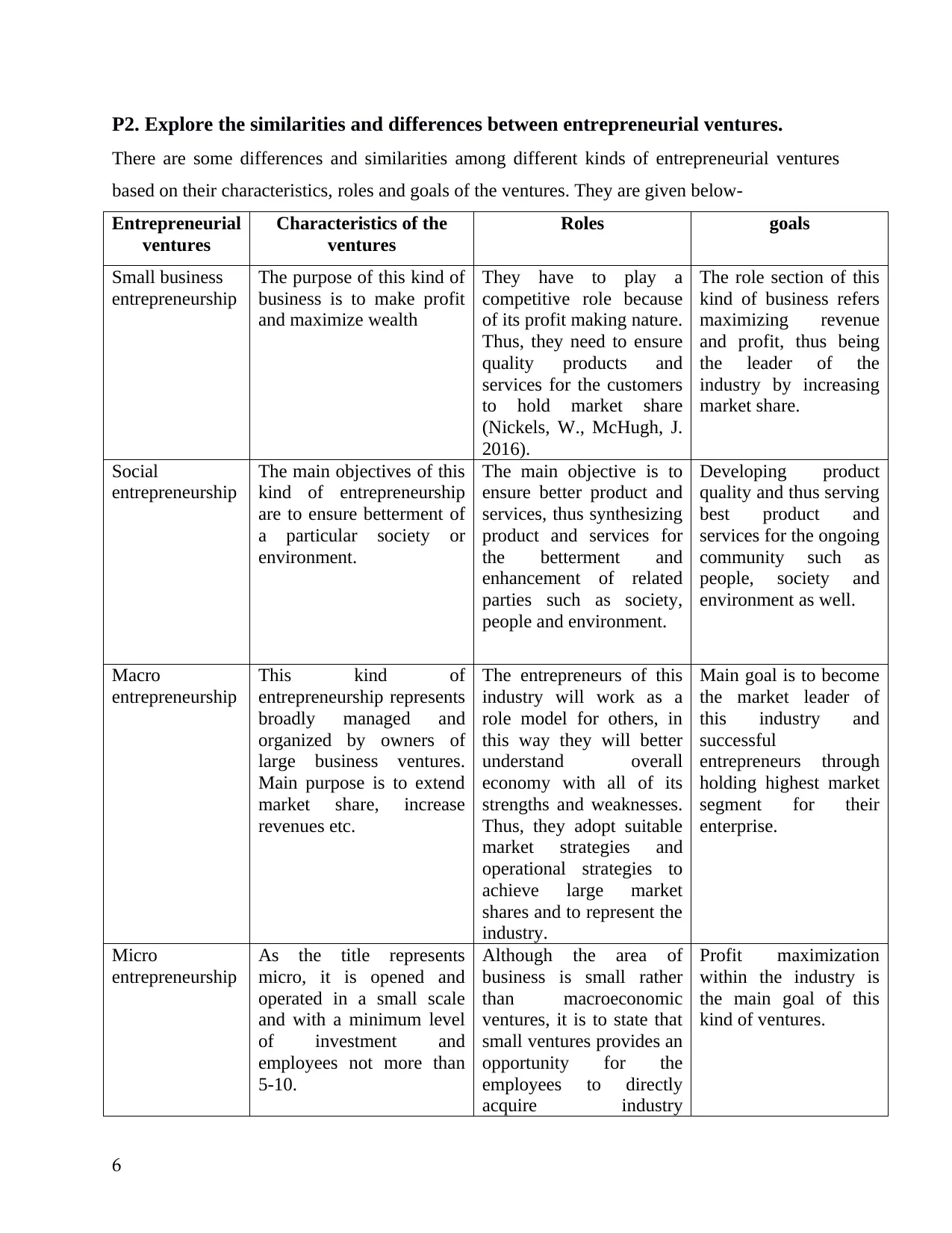
P2. Explore the similarities and differences between entrepreneurial ventures.
There are some differences and similarities among different kinds of entrepreneurial ventures
based on their characteristics, roles and goals of the ventures. They are given below-
Entrepreneurial
ventures
Characteristics of the
ventures
Roles goals
Small business
entrepreneurship
The purpose of this kind of
business is to make profit
and maximize wealth
They have to play a
competitive role because
of its profit making nature.
Thus, they need to ensure
quality products and
services for the customers
to hold market share
(Nickels, W., McHugh, J.
2016).
The role section of this
kind of business refers
maximizing revenue
and profit, thus being
the leader of the
industry by increasing
market share.
Social
entrepreneurship
The main objectives of this
kind of entrepreneurship
are to ensure betterment of
a particular society or
environment.
The main objective is to
ensure better product and
services, thus synthesizing
product and services for
the betterment and
enhancement of related
parties such as society,
people and environment.
Developing product
quality and thus serving
best product and
services for the ongoing
community such as
people, society and
environment as well.
Macro
entrepreneurship
This kind of
entrepreneurship represents
broadly managed and
organized by owners of
large business ventures.
Main purpose is to extend
market share, increase
revenues etc.
The entrepreneurs of this
industry will work as a
role model for others, in
this way they will better
understand overall
economy with all of its
strengths and weaknesses.
Thus, they adopt suitable
market strategies and
operational strategies to
achieve large market
shares and to represent the
industry.
Main goal is to become
the market leader of
this industry and
successful
entrepreneurs through
holding highest market
segment for their
enterprise.
Micro
entrepreneurship
As the title represents
micro, it is opened and
operated in a small scale
and with a minimum level
of investment and
employees not more than
5-10.
Although the area of
business is small rather
than macroeconomic
ventures, it is to state that
small ventures provides an
opportunity for the
employees to directly
acquire industry
Profit maximization
within the industry is
the main goal of this
kind of ventures.
6
There are some differences and similarities among different kinds of entrepreneurial ventures
based on their characteristics, roles and goals of the ventures. They are given below-
Entrepreneurial
ventures
Characteristics of the
ventures
Roles goals
Small business
entrepreneurship
The purpose of this kind of
business is to make profit
and maximize wealth
They have to play a
competitive role because
of its profit making nature.
Thus, they need to ensure
quality products and
services for the customers
to hold market share
(Nickels, W., McHugh, J.
2016).
The role section of this
kind of business refers
maximizing revenue
and profit, thus being
the leader of the
industry by increasing
market share.
Social
entrepreneurship
The main objectives of this
kind of entrepreneurship
are to ensure betterment of
a particular society or
environment.
The main objective is to
ensure better product and
services, thus synthesizing
product and services for
the betterment and
enhancement of related
parties such as society,
people and environment.
Developing product
quality and thus serving
best product and
services for the ongoing
community such as
people, society and
environment as well.
Macro
entrepreneurship
This kind of
entrepreneurship represents
broadly managed and
organized by owners of
large business ventures.
Main purpose is to extend
market share, increase
revenues etc.
The entrepreneurs of this
industry will work as a
role model for others, in
this way they will better
understand overall
economy with all of its
strengths and weaknesses.
Thus, they adopt suitable
market strategies and
operational strategies to
achieve large market
shares and to represent the
industry.
Main goal is to become
the market leader of
this industry and
successful
entrepreneurs through
holding highest market
segment for their
enterprise.
Micro
entrepreneurship
As the title represents
micro, it is opened and
operated in a small scale
and with a minimum level
of investment and
employees not more than
5-10.
Although the area of
business is small rather
than macroeconomic
ventures, it is to state that
small ventures provides an
opportunity for the
employees to directly
acquire industry
Profit maximization
within the industry is
the main goal of this
kind of ventures.
6
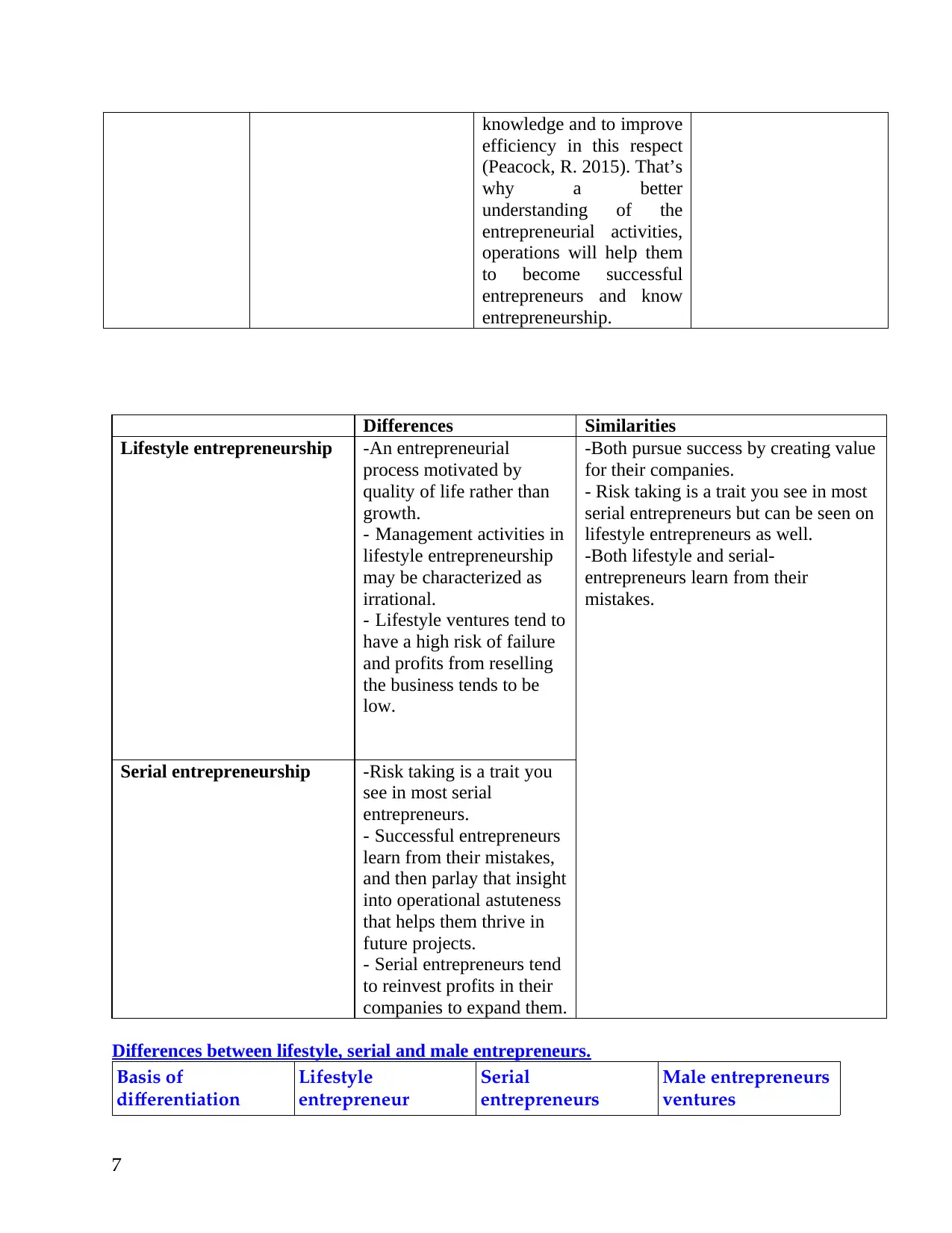
knowledge and to improve
efficiency in this respect
(Peacock, R. 2015). That’s
why a better
understanding of the
entrepreneurial activities,
operations will help them
to become successful
entrepreneurs and know
entrepreneurship.
Differences Similarities
Lifestyle entrepreneurship -An entrepreneurial
process motivated by
quality of life rather than
growth.
- Management activities in
lifestyle entrepreneurship
may be characterized as
irrational.
- Lifestyle ventures tend to
have a high risk of failure
and profits from reselling
the business tends to be
low.
-Both pursue success by creating value
for their companies.
- Risk taking is a trait you see in most
serial entrepreneurs but can be seen on
lifestyle entrepreneurs as well.
-Both lifestyle and serial-
entrepreneurs learn from their
mistakes.
Serial entrepreneurship -Risk taking is a trait you
see in most serial
entrepreneurs.
- Successful entrepreneurs
learn from their mistakes,
and then parlay that insight
into operational astuteness
that helps them thrive in
future projects.
- Serial entrepreneurs tend
to reinvest profits in their
companies to expand them.
Differences between lifestyle, serial and male entrepreneurs.
Basis of
differentiation
Lifestyle
entrepreneur
Serial
entrepreneurs
Male entrepreneurs
ventures
7
efficiency in this respect
(Peacock, R. 2015). That’s
why a better
understanding of the
entrepreneurial activities,
operations will help them
to become successful
entrepreneurs and know
entrepreneurship.
Differences Similarities
Lifestyle entrepreneurship -An entrepreneurial
process motivated by
quality of life rather than
growth.
- Management activities in
lifestyle entrepreneurship
may be characterized as
irrational.
- Lifestyle ventures tend to
have a high risk of failure
and profits from reselling
the business tends to be
low.
-Both pursue success by creating value
for their companies.
- Risk taking is a trait you see in most
serial entrepreneurs but can be seen on
lifestyle entrepreneurs as well.
-Both lifestyle and serial-
entrepreneurs learn from their
mistakes.
Serial entrepreneurship -Risk taking is a trait you
see in most serial
entrepreneurs.
- Successful entrepreneurs
learn from their mistakes,
and then parlay that insight
into operational astuteness
that helps them thrive in
future projects.
- Serial entrepreneurs tend
to reinvest profits in their
companies to expand them.
Differences between lifestyle, serial and male entrepreneurs.
Basis of
differentiation
Lifestyle
entrepreneur
Serial
entrepreneurs
Male entrepreneurs
ventures
7
Paraphrase This Document
Need a fresh take? Get an instant paraphrase of this document with our AI Paraphraser
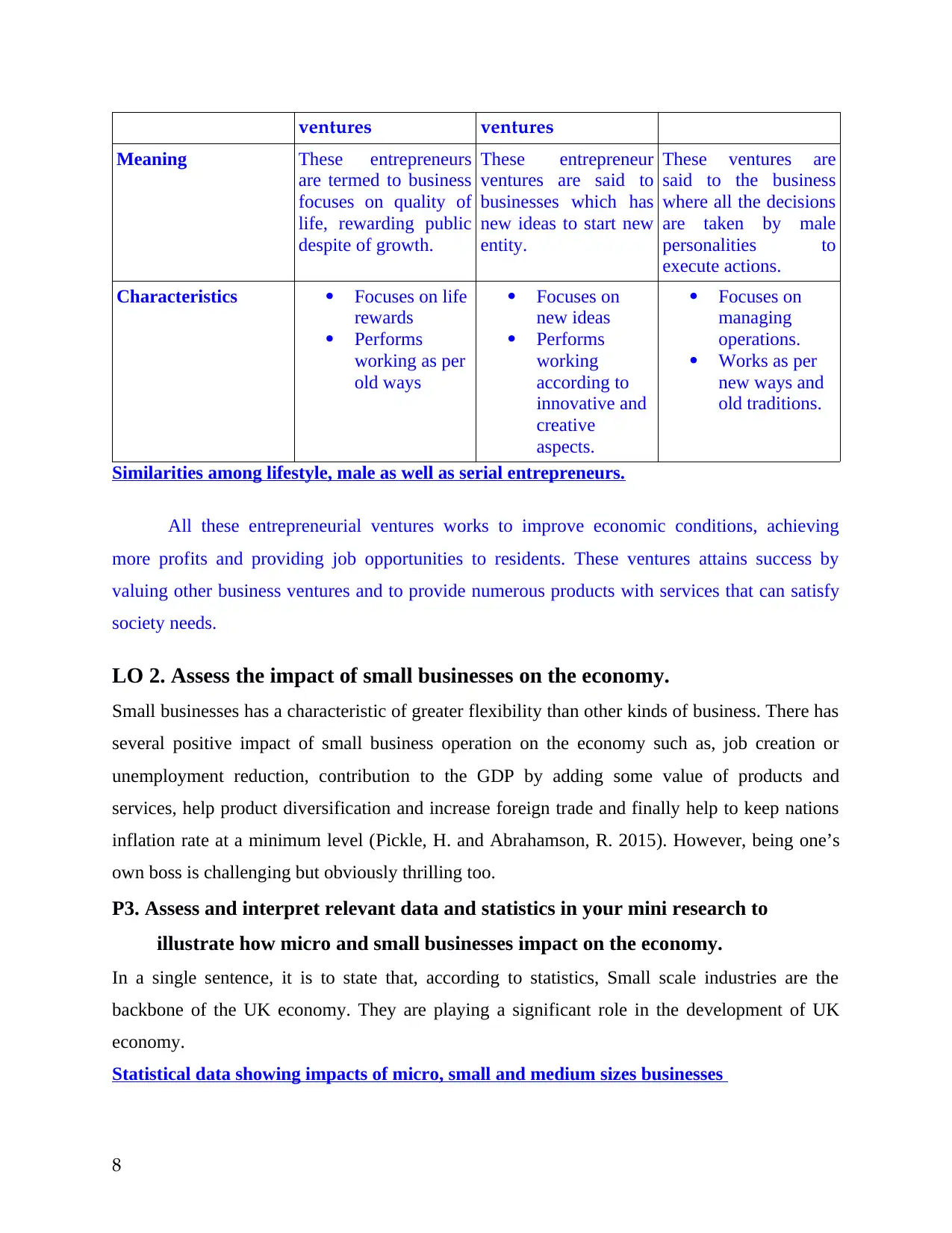
ventures ventures
Meaning These entrepreneurs
are termed to business
focuses on quality of
life, rewarding public
despite of growth.
These entrepreneur
ventures are said to
businesses which has
new ideas to start new
entity.
These ventures are
said to the business
where all the decisions
are taken by male
personalities to
execute actions.
Characteristics Focuses on life
rewards
Performs
working as per
old ways
Focuses on
new ideas
Performs
working
according to
innovative and
creative
aspects.
Focuses on
managing
operations.
Works as per
new ways and
old traditions.
Similarities among lifestyle, male as well as serial entrepreneurs.
All these entrepreneurial ventures works to improve economic conditions, achieving
more profits and providing job opportunities to residents. These ventures attains success by
valuing other business ventures and to provide numerous products with services that can satisfy
society needs.
LO 2. Assess the impact of small businesses on the economy.
Small businesses has a characteristic of greater flexibility than other kinds of business. There has
several positive impact of small business operation on the economy such as, job creation or
unemployment reduction, contribution to the GDP by adding some value of products and
services, help product diversification and increase foreign trade and finally help to keep nations
inflation rate at a minimum level (Pickle, H. and Abrahamson, R. 2015). However, being one’s
own boss is challenging but obviously thrilling too.
P3. Assess and interpret relevant data and statistics in your mini research to
illustrate how micro and small businesses impact on the economy.
In a single sentence, it is to state that, according to statistics, Small scale industries are the
backbone of the UK economy. They are playing a significant role in the development of UK
economy.
Statistical data showing impacts of micro, small and medium sizes businesses
8
Meaning These entrepreneurs
are termed to business
focuses on quality of
life, rewarding public
despite of growth.
These entrepreneur
ventures are said to
businesses which has
new ideas to start new
entity.
These ventures are
said to the business
where all the decisions
are taken by male
personalities to
execute actions.
Characteristics Focuses on life
rewards
Performs
working as per
old ways
Focuses on
new ideas
Performs
working
according to
innovative and
creative
aspects.
Focuses on
managing
operations.
Works as per
new ways and
old traditions.
Similarities among lifestyle, male as well as serial entrepreneurs.
All these entrepreneurial ventures works to improve economic conditions, achieving
more profits and providing job opportunities to residents. These ventures attains success by
valuing other business ventures and to provide numerous products with services that can satisfy
society needs.
LO 2. Assess the impact of small businesses on the economy.
Small businesses has a characteristic of greater flexibility than other kinds of business. There has
several positive impact of small business operation on the economy such as, job creation or
unemployment reduction, contribution to the GDP by adding some value of products and
services, help product diversification and increase foreign trade and finally help to keep nations
inflation rate at a minimum level (Pickle, H. and Abrahamson, R. 2015). However, being one’s
own boss is challenging but obviously thrilling too.
P3. Assess and interpret relevant data and statistics in your mini research to
illustrate how micro and small businesses impact on the economy.
In a single sentence, it is to state that, according to statistics, Small scale industries are the
backbone of the UK economy. They are playing a significant role in the development of UK
economy.
Statistical data showing impacts of micro, small and medium sizes businesses
8
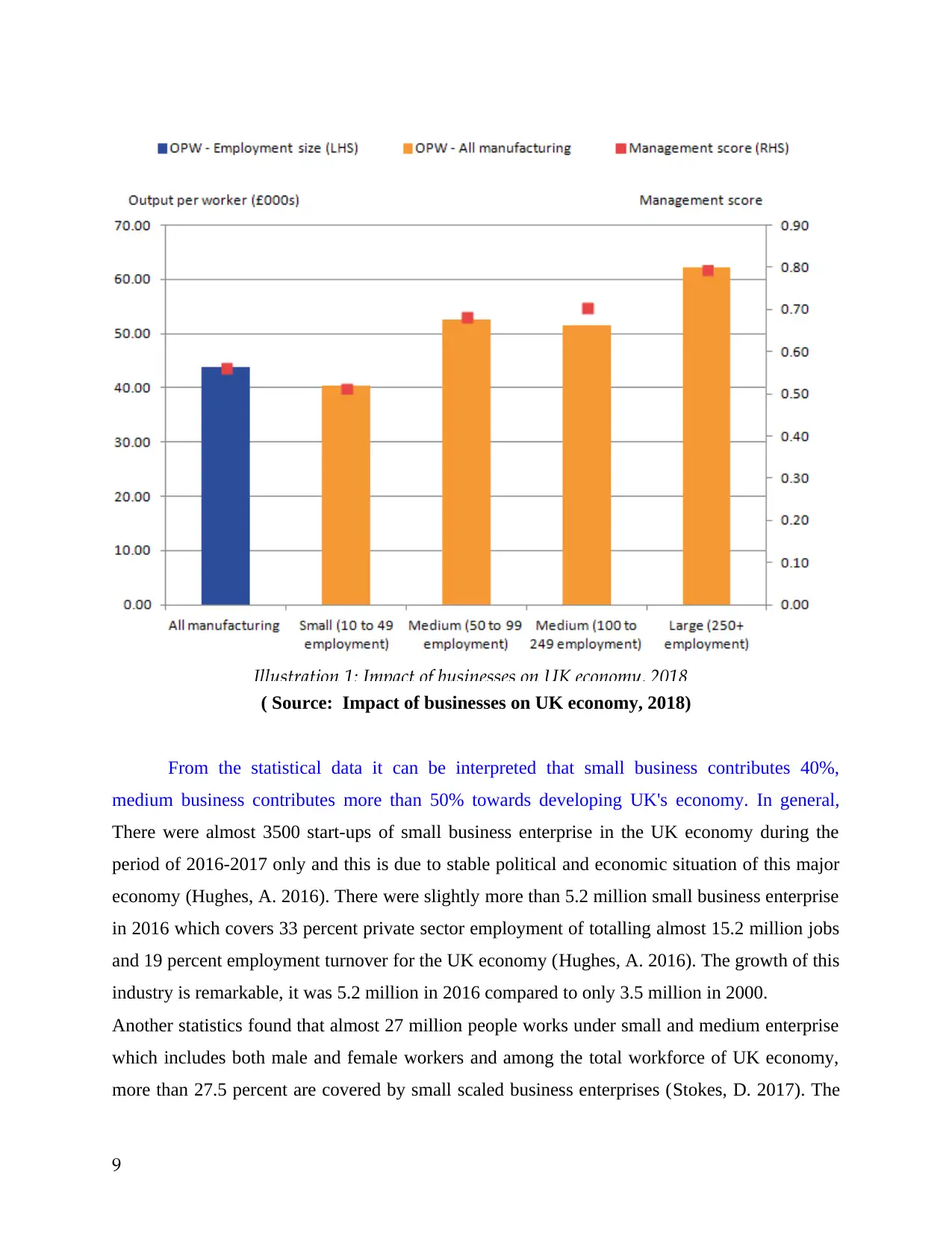
Illustration 1: Impact of businesses on UK economy, 2018
( Source: Impact of businesses on UK economy, 2018)
From the statistical data it can be interpreted that small business contributes 40%,
medium business contributes more than 50% towards developing UK's economy. In general,
There were almost 3500 start-ups of small business enterprise in the UK economy during the
period of 2016-2017 only and this is due to stable political and economic situation of this major
economy (Hughes, A. 2016). There were slightly more than 5.2 million small business enterprise
in 2016 which covers 33 percent private sector employment of totalling almost 15.2 million jobs
and 19 percent employment turnover for the UK economy (Hughes, A. 2016). The growth of this
industry is remarkable, it was 5.2 million in 2016 compared to only 3.5 million in 2000.
Another statistics found that almost 27 million people works under small and medium enterprise
which includes both male and female workers and among the total workforce of UK economy,
more than 27.5 percent are covered by small scaled business enterprises (Stokes, D. 2017). The
9
( Source: Impact of businesses on UK economy, 2018)
From the statistical data it can be interpreted that small business contributes 40%,
medium business contributes more than 50% towards developing UK's economy. In general,
There were almost 3500 start-ups of small business enterprise in the UK economy during the
period of 2016-2017 only and this is due to stable political and economic situation of this major
economy (Hughes, A. 2016). There were slightly more than 5.2 million small business enterprise
in 2016 which covers 33 percent private sector employment of totalling almost 15.2 million jobs
and 19 percent employment turnover for the UK economy (Hughes, A. 2016). The growth of this
industry is remarkable, it was 5.2 million in 2016 compared to only 3.5 million in 2000.
Another statistics found that almost 27 million people works under small and medium enterprise
which includes both male and female workers and among the total workforce of UK economy,
more than 27.5 percent are covered by small scaled business enterprises (Stokes, D. 2017). The
9
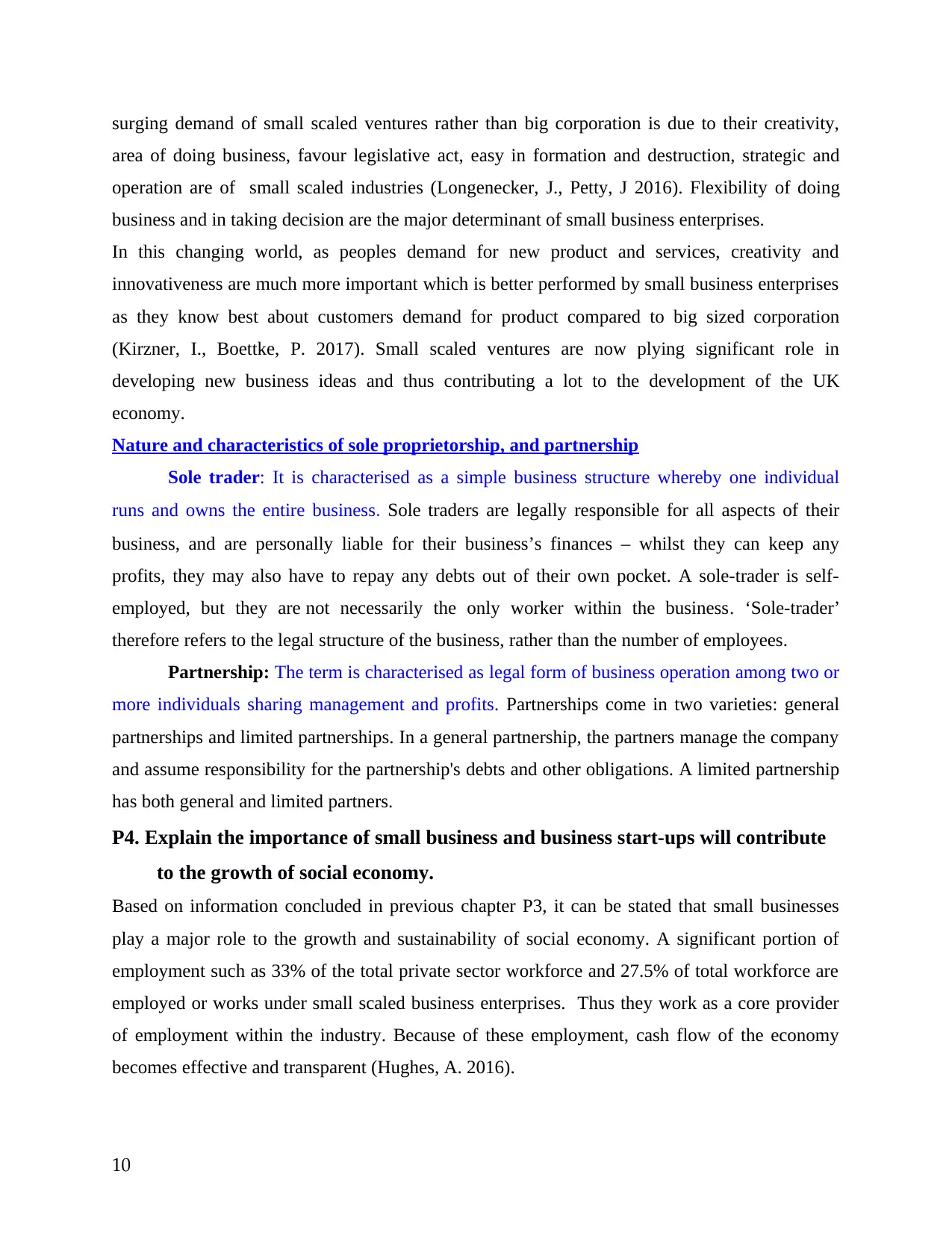
surging demand of small scaled ventures rather than big corporation is due to their creativity,
area of doing business, favour legislative act, easy in formation and destruction, strategic and
operation are of small scaled industries (Longenecker, J., Petty, J 2016). Flexibility of doing
business and in taking decision are the major determinant of small business enterprises.
In this changing world, as peoples demand for new product and services, creativity and
innovativeness are much more important which is better performed by small business enterprises
as they know best about customers demand for product compared to big sized corporation
(Kirzner, I., Boettke, P. 2017). Small scaled ventures are now plying significant role in
developing new business ideas and thus contributing a lot to the development of the UK
economy.
Nature and characteristics of sole proprietorship, and partnership
Sole trader: It is characterised as a simple business structure whereby one individual
runs and owns the entire business. Sole traders are legally responsible for all aspects of their
business, and are personally liable for their business’s finances – whilst they can keep any
profits, they may also have to repay any debts out of their own pocket. A sole-trader is self-
employed, but they are not necessarily the only worker within the business. ‘Sole-trader’
therefore refers to the legal structure of the business, rather than the number of employees.
Partnership: The term is characterised as legal form of business operation among two or
more individuals sharing management and profits. Partnerships come in two varieties: general
partnerships and limited partnerships. In a general partnership, the partners manage the company
and assume responsibility for the partnership's debts and other obligations. A limited partnership
has both general and limited partners.
P4. Explain the importance of small business and business start-ups will contribute
to the growth of social economy.
Based on information concluded in previous chapter P3, it can be stated that small businesses
play a major role to the growth and sustainability of social economy. A significant portion of
employment such as 33% of the total private sector workforce and 27.5% of total workforce are
employed or works under small scaled business enterprises. Thus they work as a core provider
of employment within the industry. Because of these employment, cash flow of the economy
becomes effective and transparent (Hughes, A. 2016).
10
area of doing business, favour legislative act, easy in formation and destruction, strategic and
operation are of small scaled industries (Longenecker, J., Petty, J 2016). Flexibility of doing
business and in taking decision are the major determinant of small business enterprises.
In this changing world, as peoples demand for new product and services, creativity and
innovativeness are much more important which is better performed by small business enterprises
as they know best about customers demand for product compared to big sized corporation
(Kirzner, I., Boettke, P. 2017). Small scaled ventures are now plying significant role in
developing new business ideas and thus contributing a lot to the development of the UK
economy.
Nature and characteristics of sole proprietorship, and partnership
Sole trader: It is characterised as a simple business structure whereby one individual
runs and owns the entire business. Sole traders are legally responsible for all aspects of their
business, and are personally liable for their business’s finances – whilst they can keep any
profits, they may also have to repay any debts out of their own pocket. A sole-trader is self-
employed, but they are not necessarily the only worker within the business. ‘Sole-trader’
therefore refers to the legal structure of the business, rather than the number of employees.
Partnership: The term is characterised as legal form of business operation among two or
more individuals sharing management and profits. Partnerships come in two varieties: general
partnerships and limited partnerships. In a general partnership, the partners manage the company
and assume responsibility for the partnership's debts and other obligations. A limited partnership
has both general and limited partners.
P4. Explain the importance of small business and business start-ups will contribute
to the growth of social economy.
Based on information concluded in previous chapter P3, it can be stated that small businesses
play a major role to the growth and sustainability of social economy. A significant portion of
employment such as 33% of the total private sector workforce and 27.5% of total workforce are
employed or works under small scaled business enterprises. Thus they work as a core provider
of employment within the industry. Because of these employment, cash flow of the economy
becomes effective and transparent (Hughes, A. 2016).
10
Secure Best Marks with AI Grader
Need help grading? Try our AI Grader for instant feedback on your assignments.
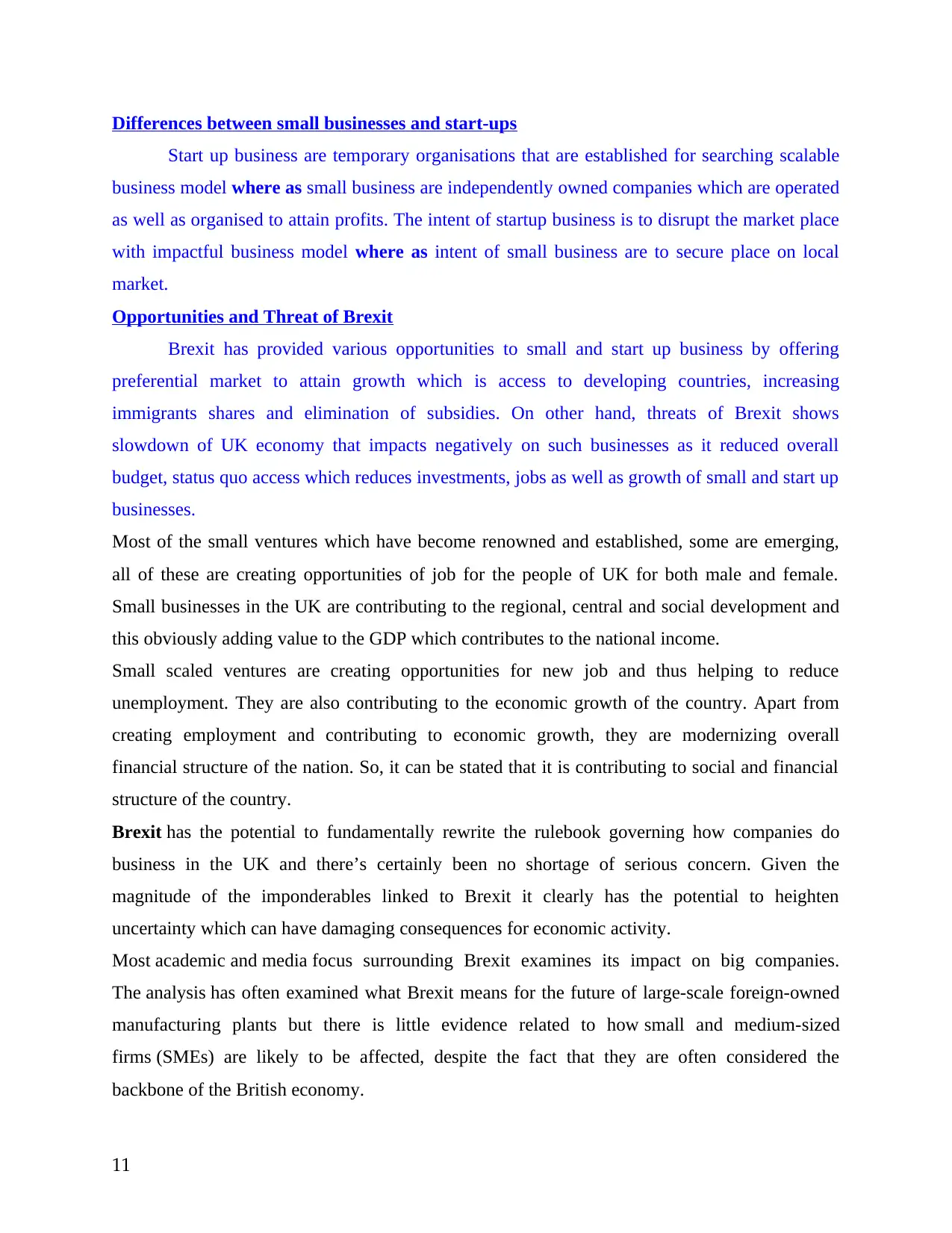
Differences between small businesses and start-ups
Start up business are temporary organisations that are established for searching scalable
business model where as small business are independently owned companies which are operated
as well as organised to attain profits. The intent of startup business is to disrupt the market place
with impactful business model where as intent of small business are to secure place on local
market.
Opportunities and Threat of Brexit
Brexit has provided various opportunities to small and start up business by offering
preferential market to attain growth which is access to developing countries, increasing
immigrants shares and elimination of subsidies. On other hand, threats of Brexit shows
slowdown of UK economy that impacts negatively on such businesses as it reduced overall
budget, status quo access which reduces investments, jobs as well as growth of small and start up
businesses.
Most of the small ventures which have become renowned and established, some are emerging,
all of these are creating opportunities of job for the people of UK for both male and female.
Small businesses in the UK are contributing to the regional, central and social development and
this obviously adding value to the GDP which contributes to the national income.
Small scaled ventures are creating opportunities for new job and thus helping to reduce
unemployment. They are also contributing to the economic growth of the country. Apart from
creating employment and contributing to economic growth, they are modernizing overall
financial structure of the nation. So, it can be stated that it is contributing to social and financial
structure of the country.
Brexit has the potential to fundamentally rewrite the rulebook governing how companies do
business in the UK and there’s certainly been no shortage of serious concern. Given the
magnitude of the imponderables linked to Brexit it clearly has the potential to heighten
uncertainty which can have damaging consequences for economic activity.
Most academic and media focus surrounding Brexit examines its impact on big companies.
The analysis has often examined what Brexit means for the future of large-scale foreign-owned
manufacturing plants but there is little evidence related to how small and medium-sized
firms (SMEs) are likely to be affected, despite the fact that they are often considered the
backbone of the British economy.
11
Start up business are temporary organisations that are established for searching scalable
business model where as small business are independently owned companies which are operated
as well as organised to attain profits. The intent of startup business is to disrupt the market place
with impactful business model where as intent of small business are to secure place on local
market.
Opportunities and Threat of Brexit
Brexit has provided various opportunities to small and start up business by offering
preferential market to attain growth which is access to developing countries, increasing
immigrants shares and elimination of subsidies. On other hand, threats of Brexit shows
slowdown of UK economy that impacts negatively on such businesses as it reduced overall
budget, status quo access which reduces investments, jobs as well as growth of small and start up
businesses.
Most of the small ventures which have become renowned and established, some are emerging,
all of these are creating opportunities of job for the people of UK for both male and female.
Small businesses in the UK are contributing to the regional, central and social development and
this obviously adding value to the GDP which contributes to the national income.
Small scaled ventures are creating opportunities for new job and thus helping to reduce
unemployment. They are also contributing to the economic growth of the country. Apart from
creating employment and contributing to economic growth, they are modernizing overall
financial structure of the nation. So, it can be stated that it is contributing to social and financial
structure of the country.
Brexit has the potential to fundamentally rewrite the rulebook governing how companies do
business in the UK and there’s certainly been no shortage of serious concern. Given the
magnitude of the imponderables linked to Brexit it clearly has the potential to heighten
uncertainty which can have damaging consequences for economic activity.
Most academic and media focus surrounding Brexit examines its impact on big companies.
The analysis has often examined what Brexit means for the future of large-scale foreign-owned
manufacturing plants but there is little evidence related to how small and medium-sized
firms (SMEs) are likely to be affected, despite the fact that they are often considered the
backbone of the British economy.
11
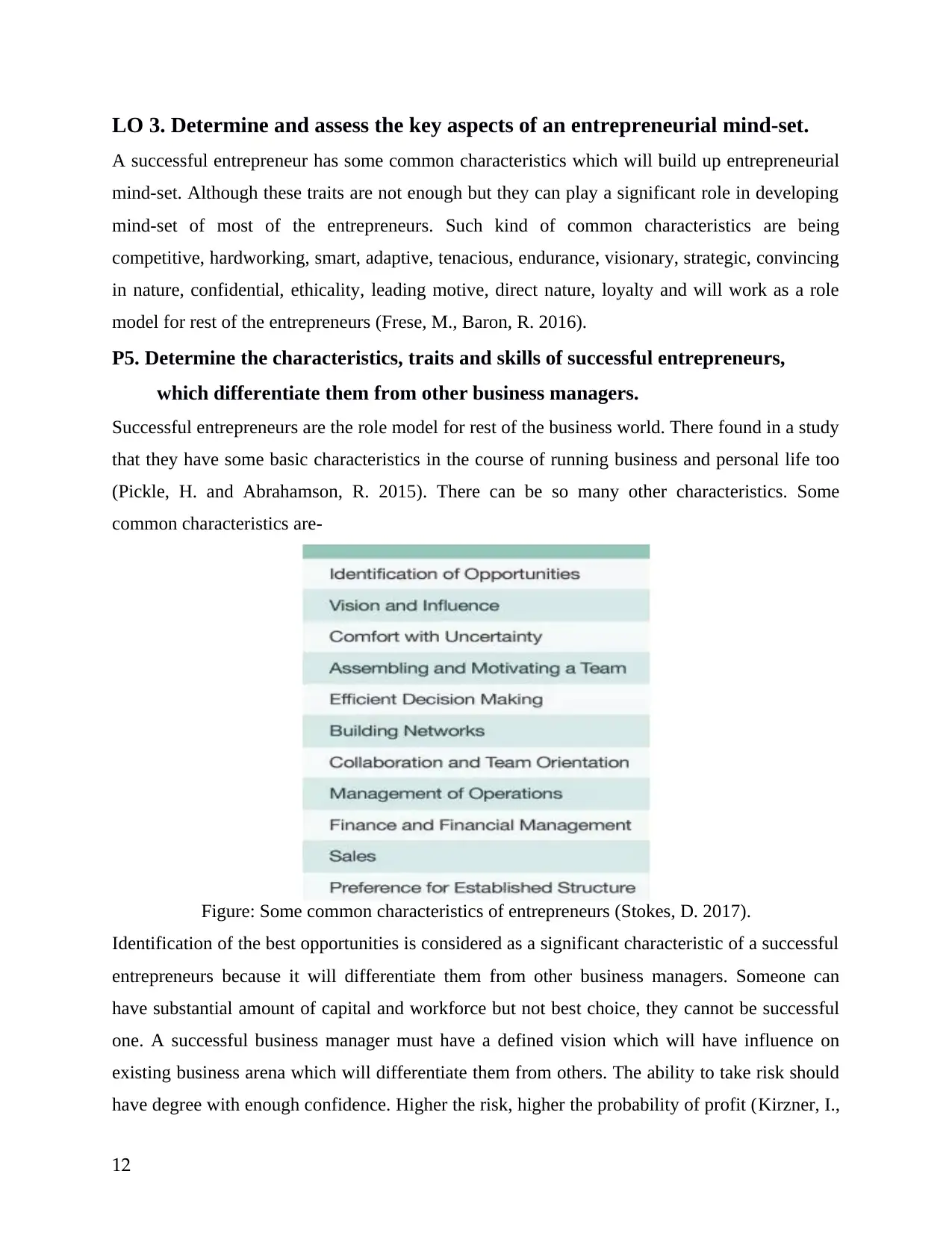
LO 3. Determine and assess the key aspects of an entrepreneurial mind-set.
A successful entrepreneur has some common characteristics which will build up entrepreneurial
mind-set. Although these traits are not enough but they can play a significant role in developing
mind-set of most of the entrepreneurs. Such kind of common characteristics are being
competitive, hardworking, smart, adaptive, tenacious, endurance, visionary, strategic, convincing
in nature, confidential, ethicality, leading motive, direct nature, loyalty and will work as a role
model for rest of the entrepreneurs (Frese, M., Baron, R. 2016).
P5. Determine the characteristics, traits and skills of successful entrepreneurs,
which differentiate them from other business managers.
Successful entrepreneurs are the role model for rest of the business world. There found in a study
that they have some basic characteristics in the course of running business and personal life too
(Pickle, H. and Abrahamson, R. 2015). There can be so many other characteristics. Some
common characteristics are-
Figure: Some common characteristics of entrepreneurs (Stokes, D. 2017).
Identification of the best opportunities is considered as a significant characteristic of a successful
entrepreneurs because it will differentiate them from other business managers. Someone can
have substantial amount of capital and workforce but not best choice, they cannot be successful
one. A successful business manager must have a defined vision which will have influence on
existing business arena which will differentiate them from others. The ability to take risk should
have degree with enough confidence. Higher the risk, higher the probability of profit (Kirzner, I.,
12
A successful entrepreneur has some common characteristics which will build up entrepreneurial
mind-set. Although these traits are not enough but they can play a significant role in developing
mind-set of most of the entrepreneurs. Such kind of common characteristics are being
competitive, hardworking, smart, adaptive, tenacious, endurance, visionary, strategic, convincing
in nature, confidential, ethicality, leading motive, direct nature, loyalty and will work as a role
model for rest of the entrepreneurs (Frese, M., Baron, R. 2016).
P5. Determine the characteristics, traits and skills of successful entrepreneurs,
which differentiate them from other business managers.
Successful entrepreneurs are the role model for rest of the business world. There found in a study
that they have some basic characteristics in the course of running business and personal life too
(Pickle, H. and Abrahamson, R. 2015). There can be so many other characteristics. Some
common characteristics are-
Figure: Some common characteristics of entrepreneurs (Stokes, D. 2017).
Identification of the best opportunities is considered as a significant characteristic of a successful
entrepreneurs because it will differentiate them from other business managers. Someone can
have substantial amount of capital and workforce but not best choice, they cannot be successful
one. A successful business manager must have a defined vision which will have influence on
existing business arena which will differentiate them from others. The ability to take risk should
have degree with enough confidence. Higher the risk, higher the probability of profit (Kirzner, I.,
12
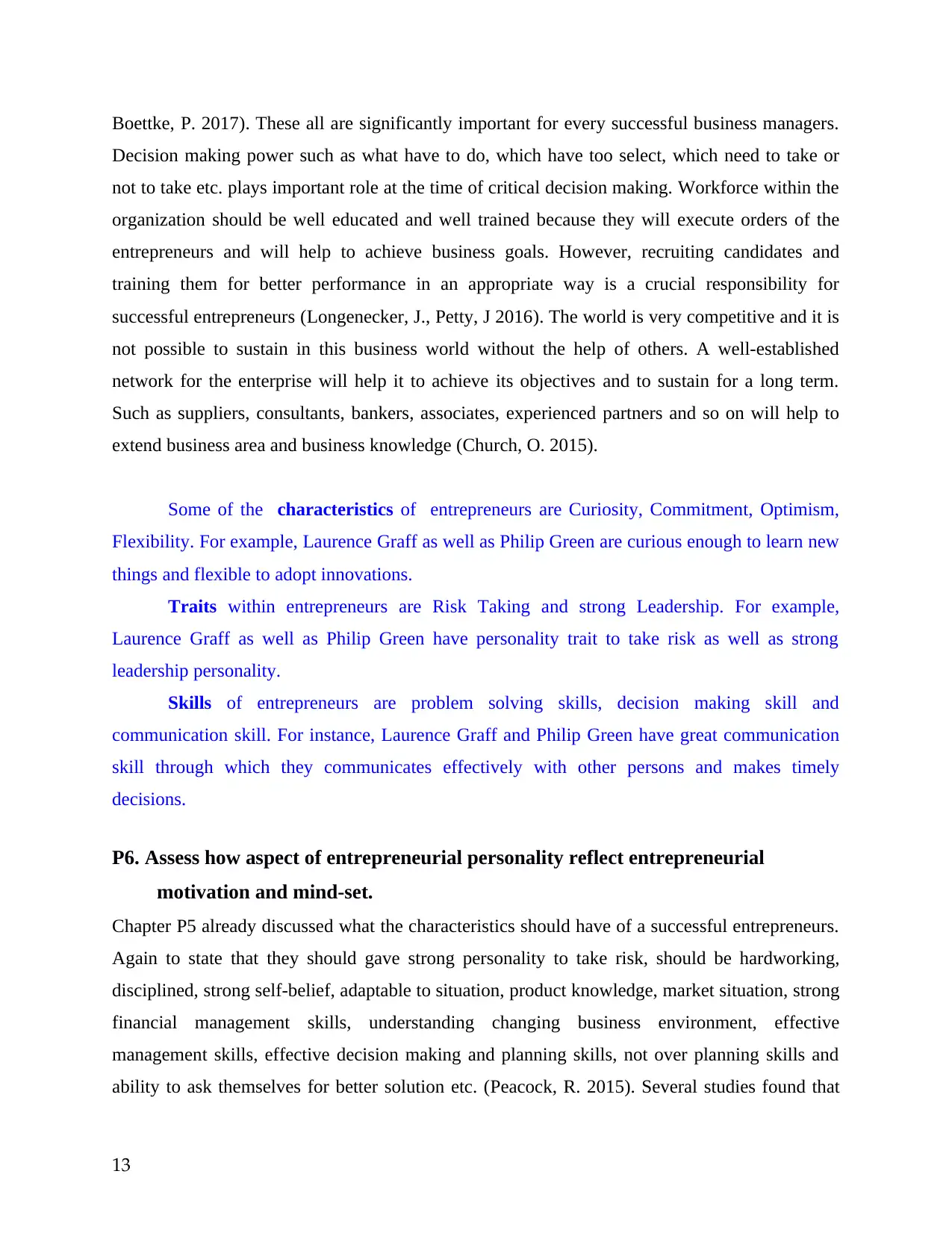
Boettke, P. 2017). These all are significantly important for every successful business managers.
Decision making power such as what have to do, which have too select, which need to take or
not to take etc. plays important role at the time of critical decision making. Workforce within the
organization should be well educated and well trained because they will execute orders of the
entrepreneurs and will help to achieve business goals. However, recruiting candidates and
training them for better performance in an appropriate way is a crucial responsibility for
successful entrepreneurs (Longenecker, J., Petty, J 2016). The world is very competitive and it is
not possible to sustain in this business world without the help of others. A well-established
network for the enterprise will help it to achieve its objectives and to sustain for a long term.
Such as suppliers, consultants, bankers, associates, experienced partners and so on will help to
extend business area and business knowledge (Church, O. 2015).
Some of the characteristics of entrepreneurs are Curiosity, Commitment, Optimism,
Flexibility. For example, Laurence Graff as well as Philip Green are curious enough to learn new
things and flexible to adopt innovations.
Traits within entrepreneurs are Risk Taking and strong Leadership. For example,
Laurence Graff as well as Philip Green have personality trait to take risk as well as strong
leadership personality.
Skills of entrepreneurs are problem solving skills, decision making skill and
communication skill. For instance, Laurence Graff and Philip Green have great communication
skill through which they communicates effectively with other persons and makes timely
decisions.
P6. Assess how aspect of entrepreneurial personality reflect entrepreneurial
motivation and mind-set.
Chapter P5 already discussed what the characteristics should have of a successful entrepreneurs.
Again to state that they should gave strong personality to take risk, should be hardworking,
disciplined, strong self-belief, adaptable to situation, product knowledge, market situation, strong
financial management skills, understanding changing business environment, effective
management skills, effective decision making and planning skills, not over planning skills and
ability to ask themselves for better solution etc. (Peacock, R. 2015). Several studies found that
13
Decision making power such as what have to do, which have too select, which need to take or
not to take etc. plays important role at the time of critical decision making. Workforce within the
organization should be well educated and well trained because they will execute orders of the
entrepreneurs and will help to achieve business goals. However, recruiting candidates and
training them for better performance in an appropriate way is a crucial responsibility for
successful entrepreneurs (Longenecker, J., Petty, J 2016). The world is very competitive and it is
not possible to sustain in this business world without the help of others. A well-established
network for the enterprise will help it to achieve its objectives and to sustain for a long term.
Such as suppliers, consultants, bankers, associates, experienced partners and so on will help to
extend business area and business knowledge (Church, O. 2015).
Some of the characteristics of entrepreneurs are Curiosity, Commitment, Optimism,
Flexibility. For example, Laurence Graff as well as Philip Green are curious enough to learn new
things and flexible to adopt innovations.
Traits within entrepreneurs are Risk Taking and strong Leadership. For example,
Laurence Graff as well as Philip Green have personality trait to take risk as well as strong
leadership personality.
Skills of entrepreneurs are problem solving skills, decision making skill and
communication skill. For instance, Laurence Graff and Philip Green have great communication
skill through which they communicates effectively with other persons and makes timely
decisions.
P6. Assess how aspect of entrepreneurial personality reflect entrepreneurial
motivation and mind-set.
Chapter P5 already discussed what the characteristics should have of a successful entrepreneurs.
Again to state that they should gave strong personality to take risk, should be hardworking,
disciplined, strong self-belief, adaptable to situation, product knowledge, market situation, strong
financial management skills, understanding changing business environment, effective
management skills, effective decision making and planning skills, not over planning skills and
ability to ask themselves for better solution etc. (Peacock, R. 2015). Several studies found that
13
Paraphrase This Document
Need a fresh take? Get an instant paraphrase of this document with our AI Paraphraser
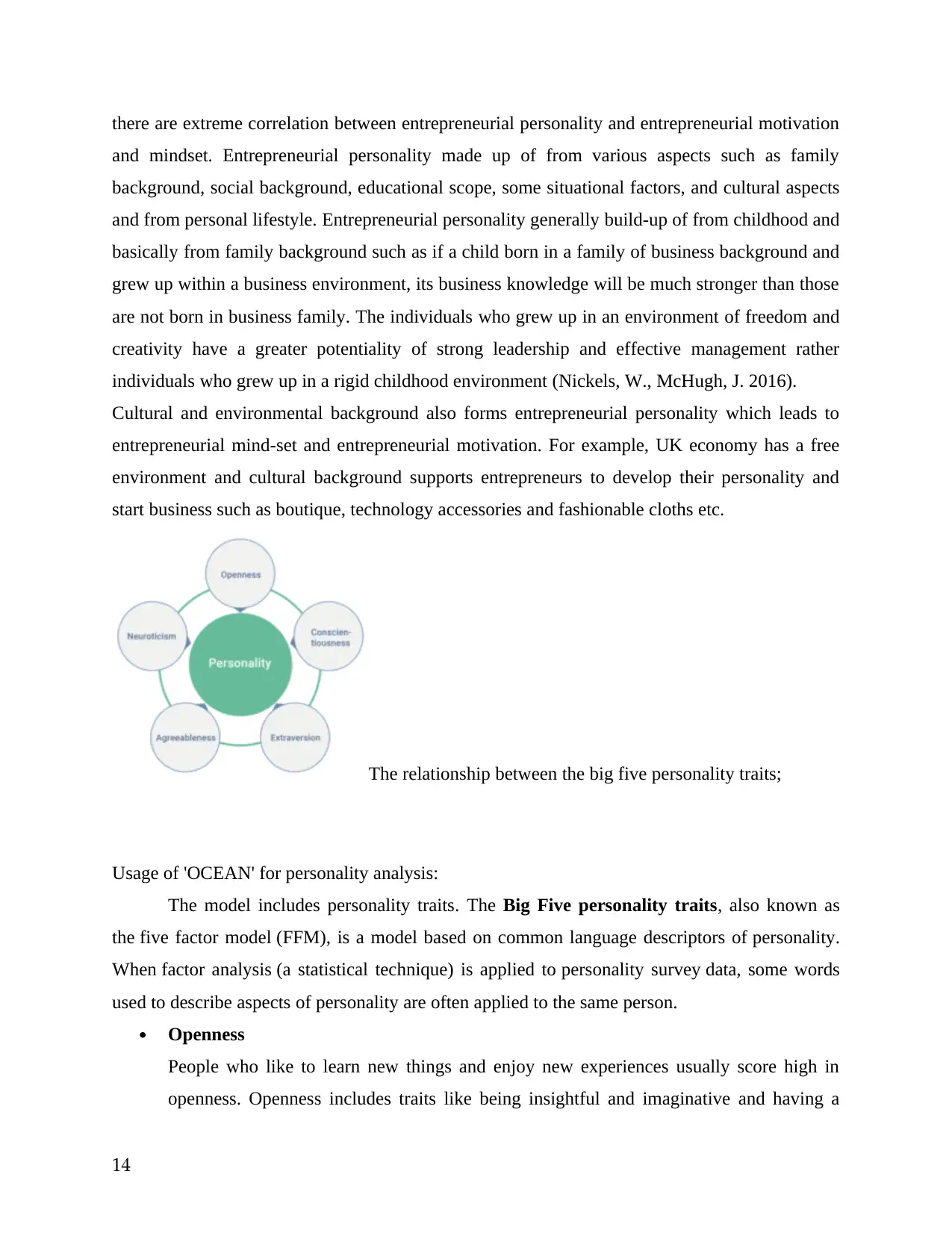
there are extreme correlation between entrepreneurial personality and entrepreneurial motivation
and mindset. Entrepreneurial personality made up of from various aspects such as family
background, social background, educational scope, some situational factors, and cultural aspects
and from personal lifestyle. Entrepreneurial personality generally build-up of from childhood and
basically from family background such as if a child born in a family of business background and
grew up within a business environment, its business knowledge will be much stronger than those
are not born in business family. The individuals who grew up in an environment of freedom and
creativity have a greater potentiality of strong leadership and effective management rather
individuals who grew up in a rigid childhood environment (Nickels, W., McHugh, J. 2016).
Cultural and environmental background also forms entrepreneurial personality which leads to
entrepreneurial mind-set and entrepreneurial motivation. For example, UK economy has a free
environment and cultural background supports entrepreneurs to develop their personality and
start business such as boutique, technology accessories and fashionable cloths etc.
The relationship between the big five personality traits;
Usage of 'OCEAN' for personality analysis:
The model includes personality traits. The Big Five personality traits, also known as
the five factor model (FFM), is a model based on common language descriptors of personality.
When factor analysis (a statistical technique) is applied to personality survey data, some words
used to describe aspects of personality are often applied to the same person.
Openness
People who like to learn new things and enjoy new experiences usually score high in
openness. Openness includes traits like being insightful and imaginative and having a
14
and mindset. Entrepreneurial personality made up of from various aspects such as family
background, social background, educational scope, some situational factors, and cultural aspects
and from personal lifestyle. Entrepreneurial personality generally build-up of from childhood and
basically from family background such as if a child born in a family of business background and
grew up within a business environment, its business knowledge will be much stronger than those
are not born in business family. The individuals who grew up in an environment of freedom and
creativity have a greater potentiality of strong leadership and effective management rather
individuals who grew up in a rigid childhood environment (Nickels, W., McHugh, J. 2016).
Cultural and environmental background also forms entrepreneurial personality which leads to
entrepreneurial mind-set and entrepreneurial motivation. For example, UK economy has a free
environment and cultural background supports entrepreneurs to develop their personality and
start business such as boutique, technology accessories and fashionable cloths etc.
The relationship between the big five personality traits;
Usage of 'OCEAN' for personality analysis:
The model includes personality traits. The Big Five personality traits, also known as
the five factor model (FFM), is a model based on common language descriptors of personality.
When factor analysis (a statistical technique) is applied to personality survey data, some words
used to describe aspects of personality are often applied to the same person.
Openness
People who like to learn new things and enjoy new experiences usually score high in
openness. Openness includes traits like being insightful and imaginative and having a
14
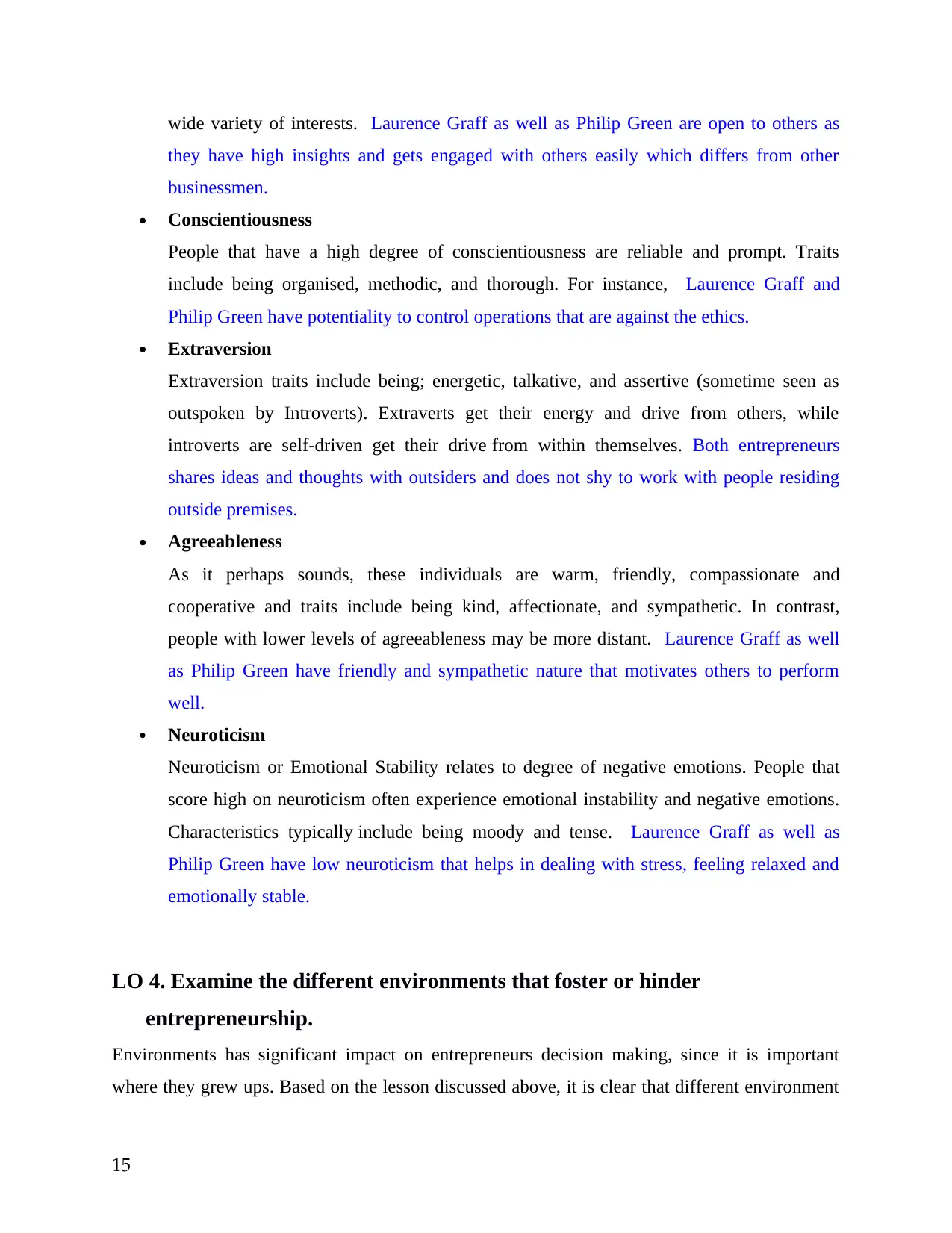
wide variety of interests. Laurence Graff as well as Philip Green are open to others as
they have high insights and gets engaged with others easily which differs from other
businessmen.
Conscientiousness
People that have a high degree of conscientiousness are reliable and prompt. Traits
include being organised, methodic, and thorough. For instance, Laurence Graff and
Philip Green have potentiality to control operations that are against the ethics.
Extraversion
Extraversion traits include being; energetic, talkative, and assertive (sometime seen as
outspoken by Introverts). Extraverts get their energy and drive from others, while
introverts are self-driven get their drive from within themselves. Both entrepreneurs
shares ideas and thoughts with outsiders and does not shy to work with people residing
outside premises.
Agreeableness
As it perhaps sounds, these individuals are warm, friendly, compassionate and
cooperative and traits include being kind, affectionate, and sympathetic. In contrast,
people with lower levels of agreeableness may be more distant. Laurence Graff as well
as Philip Green have friendly and sympathetic nature that motivates others to perform
well.
Neuroticism
Neuroticism or Emotional Stability relates to degree of negative emotions. People that
score high on neuroticism often experience emotional instability and negative emotions.
Characteristics typically include being moody and tense. Laurence Graff as well as
Philip Green have low neuroticism that helps in dealing with stress, feeling relaxed and
emotionally stable.
LO 4. Examine the different environments that foster or hinder
entrepreneurship.
Environments has significant impact on entrepreneurs decision making, since it is important
where they grew ups. Based on the lesson discussed above, it is clear that different environment
15
they have high insights and gets engaged with others easily which differs from other
businessmen.
Conscientiousness
People that have a high degree of conscientiousness are reliable and prompt. Traits
include being organised, methodic, and thorough. For instance, Laurence Graff and
Philip Green have potentiality to control operations that are against the ethics.
Extraversion
Extraversion traits include being; energetic, talkative, and assertive (sometime seen as
outspoken by Introverts). Extraverts get their energy and drive from others, while
introverts are self-driven get their drive from within themselves. Both entrepreneurs
shares ideas and thoughts with outsiders and does not shy to work with people residing
outside premises.
Agreeableness
As it perhaps sounds, these individuals are warm, friendly, compassionate and
cooperative and traits include being kind, affectionate, and sympathetic. In contrast,
people with lower levels of agreeableness may be more distant. Laurence Graff as well
as Philip Green have friendly and sympathetic nature that motivates others to perform
well.
Neuroticism
Neuroticism or Emotional Stability relates to degree of negative emotions. People that
score high on neuroticism often experience emotional instability and negative emotions.
Characteristics typically include being moody and tense. Laurence Graff as well as
Philip Green have low neuroticism that helps in dealing with stress, feeling relaxed and
emotionally stable.
LO 4. Examine the different environments that foster or hinder
entrepreneurship.
Environments has significant impact on entrepreneurs decision making, since it is important
where they grew ups. Based on the lesson discussed above, it is clear that different environment
15
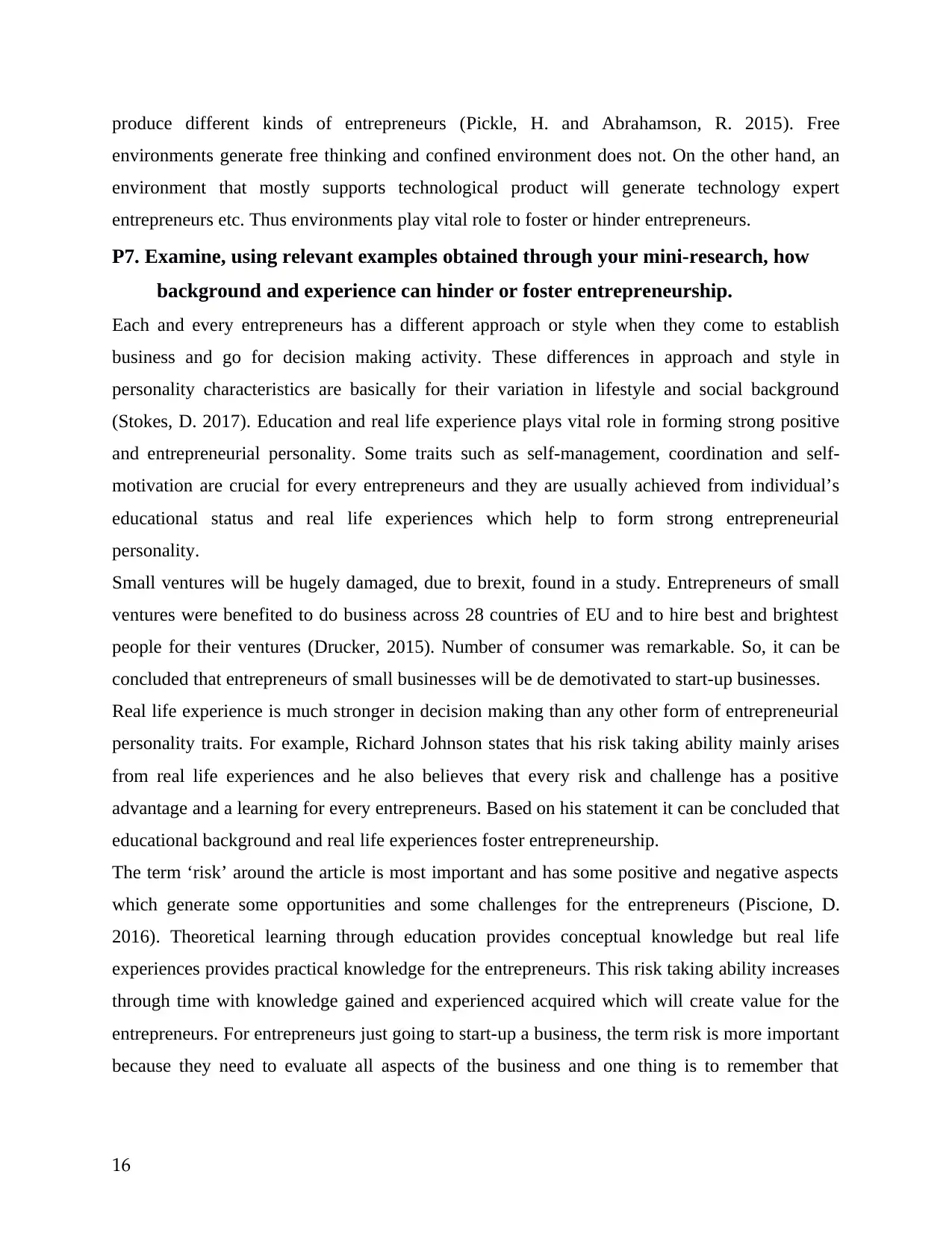
produce different kinds of entrepreneurs (Pickle, H. and Abrahamson, R. 2015). Free
environments generate free thinking and confined environment does not. On the other hand, an
environment that mostly supports technological product will generate technology expert
entrepreneurs etc. Thus environments play vital role to foster or hinder entrepreneurs.
P7. Examine, using relevant examples obtained through your mini-research, how
background and experience can hinder or foster entrepreneurship.
Each and every entrepreneurs has a different approach or style when they come to establish
business and go for decision making activity. These differences in approach and style in
personality characteristics are basically for their variation in lifestyle and social background
(Stokes, D. 2017). Education and real life experience plays vital role in forming strong positive
and entrepreneurial personality. Some traits such as self-management, coordination and self-
motivation are crucial for every entrepreneurs and they are usually achieved from individual’s
educational status and real life experiences which help to form strong entrepreneurial
personality.
Small ventures will be hugely damaged, due to brexit, found in a study. Entrepreneurs of small
ventures were benefited to do business across 28 countries of EU and to hire best and brightest
people for their ventures (Drucker, 2015). Number of consumer was remarkable. So, it can be
concluded that entrepreneurs of small businesses will be de demotivated to start-up businesses.
Real life experience is much stronger in decision making than any other form of entrepreneurial
personality traits. For example, Richard Johnson states that his risk taking ability mainly arises
from real life experiences and he also believes that every risk and challenge has a positive
advantage and a learning for every entrepreneurs. Based on his statement it can be concluded that
educational background and real life experiences foster entrepreneurship.
The term ‘risk’ around the article is most important and has some positive and negative aspects
which generate some opportunities and some challenges for the entrepreneurs (Piscione, D.
2016). Theoretical learning through education provides conceptual knowledge but real life
experiences provides practical knowledge for the entrepreneurs. This risk taking ability increases
through time with knowledge gained and experienced acquired which will create value for the
entrepreneurs. For entrepreneurs just going to start-up a business, the term risk is more important
because they need to evaluate all aspects of the business and one thing is to remember that
16
environments generate free thinking and confined environment does not. On the other hand, an
environment that mostly supports technological product will generate technology expert
entrepreneurs etc. Thus environments play vital role to foster or hinder entrepreneurs.
P7. Examine, using relevant examples obtained through your mini-research, how
background and experience can hinder or foster entrepreneurship.
Each and every entrepreneurs has a different approach or style when they come to establish
business and go for decision making activity. These differences in approach and style in
personality characteristics are basically for their variation in lifestyle and social background
(Stokes, D. 2017). Education and real life experience plays vital role in forming strong positive
and entrepreneurial personality. Some traits such as self-management, coordination and self-
motivation are crucial for every entrepreneurs and they are usually achieved from individual’s
educational status and real life experiences which help to form strong entrepreneurial
personality.
Small ventures will be hugely damaged, due to brexit, found in a study. Entrepreneurs of small
ventures were benefited to do business across 28 countries of EU and to hire best and brightest
people for their ventures (Drucker, 2015). Number of consumer was remarkable. So, it can be
concluded that entrepreneurs of small businesses will be de demotivated to start-up businesses.
Real life experience is much stronger in decision making than any other form of entrepreneurial
personality traits. For example, Richard Johnson states that his risk taking ability mainly arises
from real life experiences and he also believes that every risk and challenge has a positive
advantage and a learning for every entrepreneurs. Based on his statement it can be concluded that
educational background and real life experiences foster entrepreneurship.
The term ‘risk’ around the article is most important and has some positive and negative aspects
which generate some opportunities and some challenges for the entrepreneurs (Piscione, D.
2016). Theoretical learning through education provides conceptual knowledge but real life
experiences provides practical knowledge for the entrepreneurs. This risk taking ability increases
through time with knowledge gained and experienced acquired which will create value for the
entrepreneurs. For entrepreneurs just going to start-up a business, the term risk is more important
because they need to evaluate all aspects of the business and one thing is to remember that
16
Secure Best Marks with AI Grader
Need help grading? Try our AI Grader for instant feedback on your assignments.
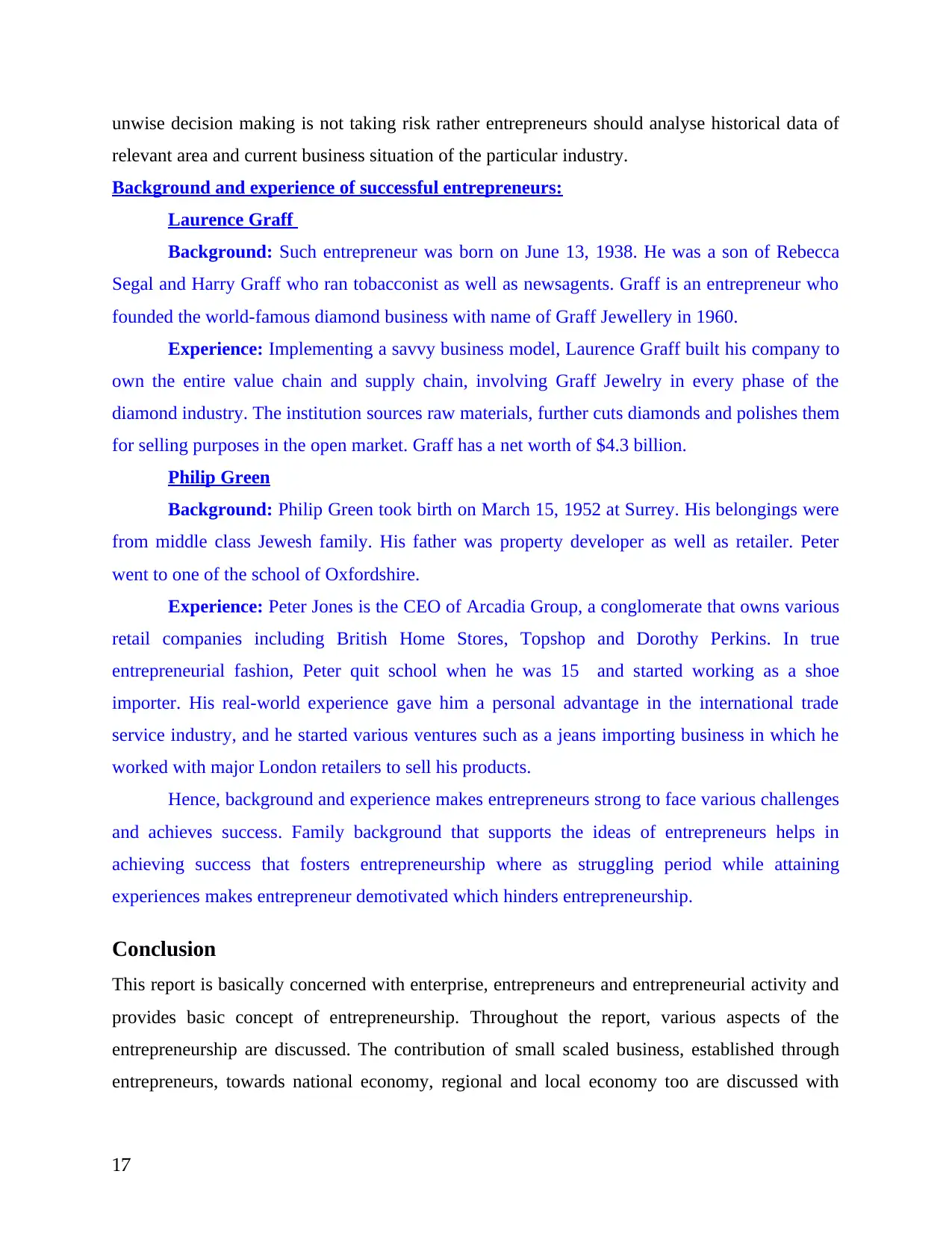
unwise decision making is not taking risk rather entrepreneurs should analyse historical data of
relevant area and current business situation of the particular industry.
Background and experience of successful entrepreneurs:
Laurence Graff
Background: Such entrepreneur was born on June 13, 1938. He was a son of Rebecca
Segal and Harry Graff who ran tobacconist as well as newsagents. Graff is an entrepreneur who
founded the world-famous diamond business with name of Graff Jewellery in 1960.
Experience: Implementing a savvy business model, Laurence Graff built his company to
own the entire value chain and supply chain, involving Graff Jewelry in every phase of the
diamond industry. The institution sources raw materials, further cuts diamonds and polishes them
for selling purposes in the open market. Graff has a net worth of $4.3 billion.
Philip Green
Background: Philip Green took birth on March 15, 1952 at Surrey. His belongings were
from middle class Jewesh family. His father was property developer as well as retailer. Peter
went to one of the school of Oxfordshire.
Experience: Peter Jones is the CEO of Arcadia Group, a conglomerate that owns various
retail companies including British Home Stores, Topshop and Dorothy Perkins. In true
entrepreneurial fashion, Peter quit school when he was 15 and started working as a shoe
importer. His real-world experience gave him a personal advantage in the international trade
service industry, and he started various ventures such as a jeans importing business in which he
worked with major London retailers to sell his products.
Hence, background and experience makes entrepreneurs strong to face various challenges
and achieves success. Family background that supports the ideas of entrepreneurs helps in
achieving success that fosters entrepreneurship where as struggling period while attaining
experiences makes entrepreneur demotivated which hinders entrepreneurship.
Conclusion
This report is basically concerned with enterprise, entrepreneurs and entrepreneurial activity and
provides basic concept of entrepreneurship. Throughout the report, various aspects of the
entrepreneurship are discussed. The contribution of small scaled business, established through
entrepreneurs, towards national economy, regional and local economy too are discussed with
17
relevant area and current business situation of the particular industry.
Background and experience of successful entrepreneurs:
Laurence Graff
Background: Such entrepreneur was born on June 13, 1938. He was a son of Rebecca
Segal and Harry Graff who ran tobacconist as well as newsagents. Graff is an entrepreneur who
founded the world-famous diamond business with name of Graff Jewellery in 1960.
Experience: Implementing a savvy business model, Laurence Graff built his company to
own the entire value chain and supply chain, involving Graff Jewelry in every phase of the
diamond industry. The institution sources raw materials, further cuts diamonds and polishes them
for selling purposes in the open market. Graff has a net worth of $4.3 billion.
Philip Green
Background: Philip Green took birth on March 15, 1952 at Surrey. His belongings were
from middle class Jewesh family. His father was property developer as well as retailer. Peter
went to one of the school of Oxfordshire.
Experience: Peter Jones is the CEO of Arcadia Group, a conglomerate that owns various
retail companies including British Home Stores, Topshop and Dorothy Perkins. In true
entrepreneurial fashion, Peter quit school when he was 15 and started working as a shoe
importer. His real-world experience gave him a personal advantage in the international trade
service industry, and he started various ventures such as a jeans importing business in which he
worked with major London retailers to sell his products.
Hence, background and experience makes entrepreneurs strong to face various challenges
and achieves success. Family background that supports the ideas of entrepreneurs helps in
achieving success that fosters entrepreneurship where as struggling period while attaining
experiences makes entrepreneur demotivated which hinders entrepreneurship.
Conclusion
This report is basically concerned with enterprise, entrepreneurs and entrepreneurial activity and
provides basic concept of entrepreneurship. Throughout the report, various aspects of the
entrepreneurship are discussed. The contribution of small scaled business, established through
entrepreneurs, towards national economy, regional and local economy too are discussed with
17

references. Some traits of the entrepreneurs that differentiate them from other business managers
are discussed with examples. Finally, several factors such as education, society, environments,
real life experiences that lead to build up entrepreneurial personality and mindset to start-up
businesses are discussed.
18
are discussed with examples. Finally, several factors such as education, society, environments,
real life experiences that lead to build up entrepreneurial personality and mindset to start-up
businesses are discussed.
18
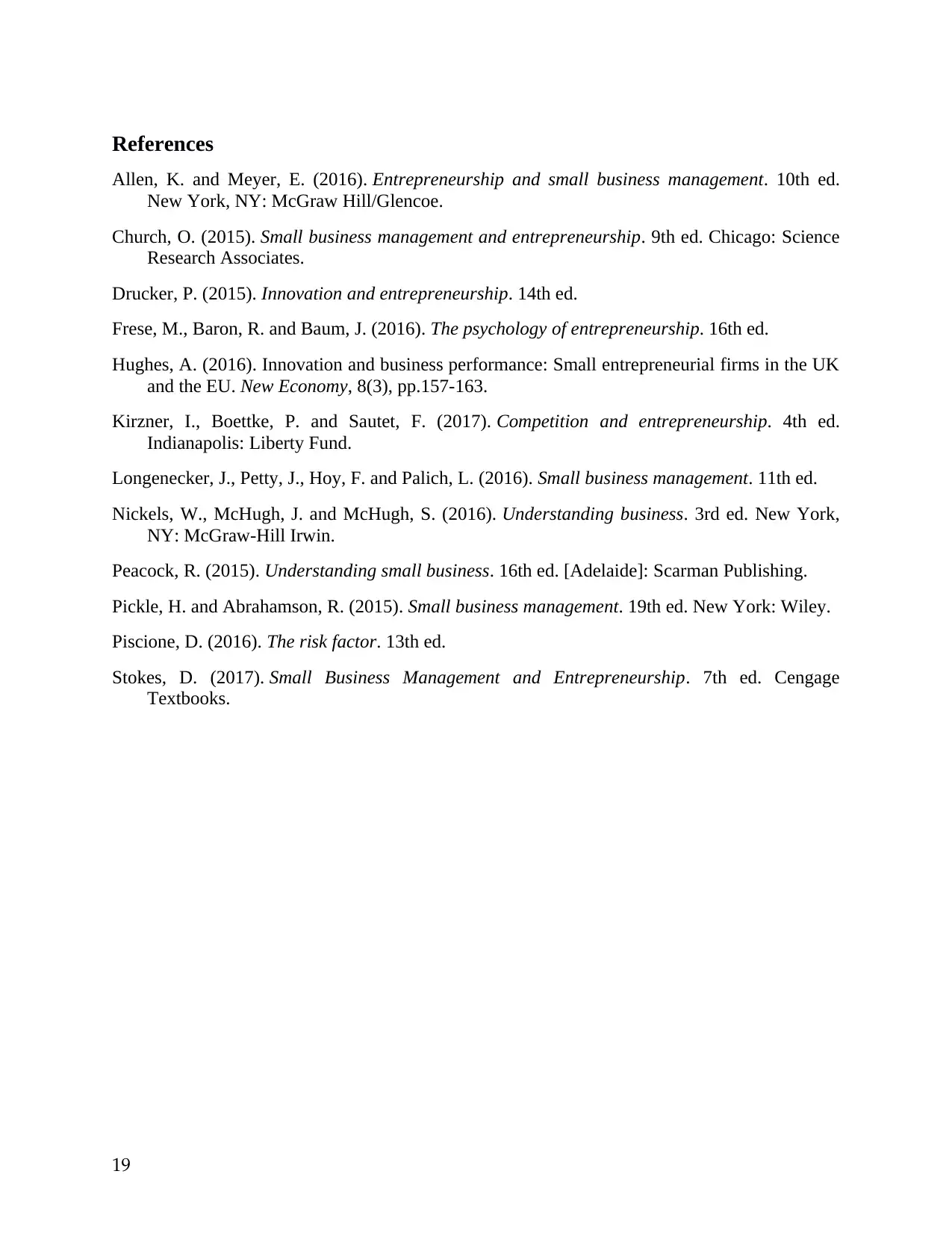
References
Allen, K. and Meyer, E. (2016). Entrepreneurship and small business management. 10th ed.
New York, NY: McGraw Hill/Glencoe.
Church, O. (2015). Small business management and entrepreneurship. 9th ed. Chicago: Science
Research Associates.
Drucker, P. (2015). Innovation and entrepreneurship. 14th ed.
Frese, M., Baron, R. and Baum, J. (2016). The psychology of entrepreneurship. 16th ed.
Hughes, A. (2016). Innovation and business performance: Small entrepreneurial firms in the UK
and the EU. New Economy, 8(3), pp.157-163.
Kirzner, I., Boettke, P. and Sautet, F. (2017). Competition and entrepreneurship. 4th ed.
Indianapolis: Liberty Fund.
Longenecker, J., Petty, J., Hoy, F. and Palich, L. (2016). Small business management. 11th ed.
Nickels, W., McHugh, J. and McHugh, S. (2016). Understanding business. 3rd ed. New York,
NY: McGraw-Hill Irwin.
Peacock, R. (2015). Understanding small business. 16th ed. [Adelaide]: Scarman Publishing.
Pickle, H. and Abrahamson, R. (2015). Small business management. 19th ed. New York: Wiley.
Piscione, D. (2016). The risk factor. 13th ed.
Stokes, D. (2017). Small Business Management and Entrepreneurship. 7th ed. Cengage
Textbooks.
19
Allen, K. and Meyer, E. (2016). Entrepreneurship and small business management. 10th ed.
New York, NY: McGraw Hill/Glencoe.
Church, O. (2015). Small business management and entrepreneurship. 9th ed. Chicago: Science
Research Associates.
Drucker, P. (2015). Innovation and entrepreneurship. 14th ed.
Frese, M., Baron, R. and Baum, J. (2016). The psychology of entrepreneurship. 16th ed.
Hughes, A. (2016). Innovation and business performance: Small entrepreneurial firms in the UK
and the EU. New Economy, 8(3), pp.157-163.
Kirzner, I., Boettke, P. and Sautet, F. (2017). Competition and entrepreneurship. 4th ed.
Indianapolis: Liberty Fund.
Longenecker, J., Petty, J., Hoy, F. and Palich, L. (2016). Small business management. 11th ed.
Nickels, W., McHugh, J. and McHugh, S. (2016). Understanding business. 3rd ed. New York,
NY: McGraw-Hill Irwin.
Peacock, R. (2015). Understanding small business. 16th ed. [Adelaide]: Scarman Publishing.
Pickle, H. and Abrahamson, R. (2015). Small business management. 19th ed. New York: Wiley.
Piscione, D. (2016). The risk factor. 13th ed.
Stokes, D. (2017). Small Business Management and Entrepreneurship. 7th ed. Cengage
Textbooks.
19
1 out of 19
Related Documents
Your All-in-One AI-Powered Toolkit for Academic Success.
+13062052269
info@desklib.com
Available 24*7 on WhatsApp / Email
![[object Object]](/_next/static/media/star-bottom.7253800d.svg)
Unlock your academic potential
© 2024 | Zucol Services PVT LTD | All rights reserved.





